OTHER BOOKS
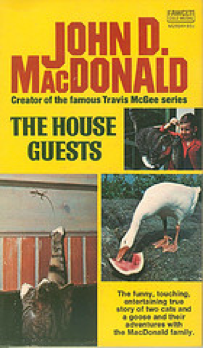
Doubleday: 1965
The funny, touching, entertaining true story of two cats and their adventures with the MacDonald family.
On the back cover there is a pictue of JDM, lying stretched out on the couch, reading, with one of the cats nestled up against his feet.
*****************************************************************************************************
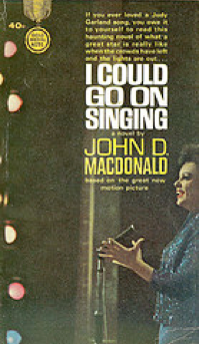
Fawcett: 1963
MacDonald’s story of Judy Garland....he was not really pleased with the end result.
*************************************************************************************************
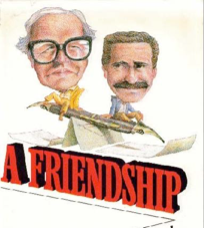
This book of letters reflects the rise and fall of Rowan and Martin's “Laugh In.” It’s a picture of a successful novelist and of a comedian dealing with success, and it is a portrait of how a friendship may live and die. At the suggestion of a mutual friend, Rowan and MacDonald began writing without having met. Their letters are frequent initially, and each writer assumes a role: MacDonald/advisor and Rowan/seeker of such. There is an abrupt break-off in 1974 as Rowan's marriage disintegrates.
*****************************************************************************************

Reading For Survival is the last published work of John D. MacDonald. It was the fruition of a project first proposed by Jean Trebbi in 1985. Jean was the Executive Director of the Florida Center For The Book, and persuaded JDM to write an essay as Florida’s contribution to the “Literary Heritage of the States,” a program of the Library of Congress Center For The Book.
In the foreword to Reading For Survival Trebbi notes that JDM had a difficult time with the project, and he expressed second thoughts about the whole matter, and he noted that he written many pages, none of which were acceptable to him.
JDM finally wrote Trebbi that one way to make his words “ fall usefully upon deaf ears is to use such colorful language that it will be quoted, sooner of later, to a great many non-readers.”
Trebbi suggested that he use a conversation beetween Meyer and McGee as a device, and JDM replied:
“Why indeed...I am very sorry for taking so damn long.”
It has been twenty-seven years since JDM died, but the final essay will indeed be read --and re-read --for its comments on many of the issues of that day, which continue to haunt us today.
If you want a copy for $15.00 please contact Tara Zimmerman at: Zimmermann, Tara <TZIMMERM@broward.org>
FIRST SALE, LAST MCGEE, AND THE LEGACY
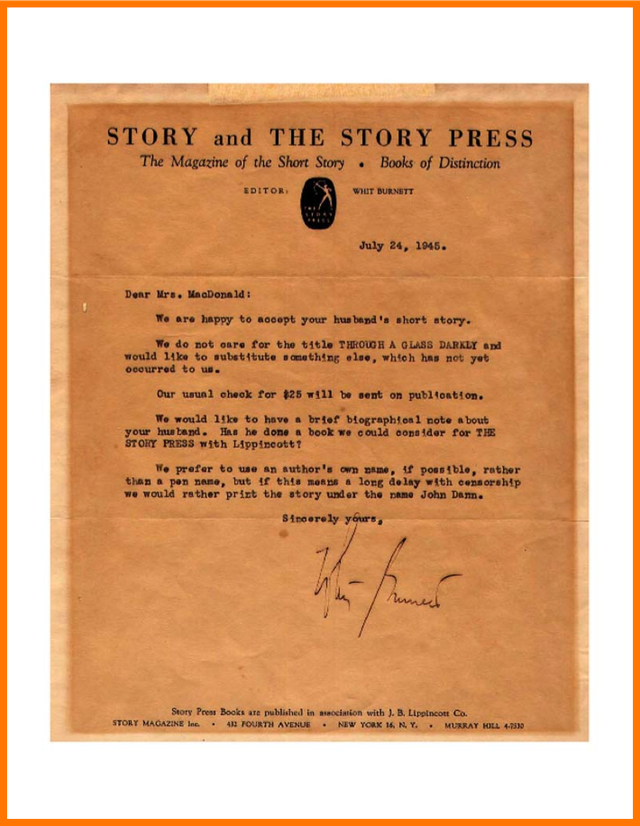
JDM’s first story was published without his knowledge. Due to heavy censorship of letters home during WWII he tired of writing the usual stuff, and sent the above story to Dorothy, his wife . She submitted it to Story Magazine, and it was accepted. When JDM disembarked from his India-Burma tour of duty in late 1945, where he was in the OSS as a quartermaster, he was met by Dorothy, son Maynard, and a check for $25.00.
*****
THE RUMOR OF THE LAST MCGEE NOVEL
From time to time readers will inquire as to the truth of the rumor that JDM
wrote a black McGee, to be published after the writer's death.
It makes for fascinating stories and theories and they do abound.
However, there is no truth involved. Both his widow, Dorothy, and his son,
Maynard, stated categorically that "There is no book or manuscript by John
which ends in Travis McGee's death.
We think John would have missed him as you would."
JDM himself said this many times. On one such occasion he replied:
"It would be really wicked so to do because of the people who haven't yet met
the gentleman."
"That would be a poor legacy to leave them."
HOWEVER: In a letter to Mickey Spillane, dated Nov. 13, 1984, it is clear that JDM was at least planning another McGee. We have not yet found any notes he may have left about that next McGee. Here is a portion of that letter:

and further, in The Red Hot Typewriter it is noted on Page. 213 that in an interview with Peter J. Heck JDM said this:
“I’m gonna end [with] the twenty-second book. I got it blocked out enough to know that if the book goes all right, which I trust it will, he’s gonna pull up stakes with a bunch of about five or six other boats, good friends and what not and acquaintances. well, he’s gonna go find find the place and then go back to Bahia Mar and they’re gonna load up and take off and move to a new marina up in the Panhandle. Up there you can find areas that are as pleasant as Fort Lauderdale was twenty years ago.
Cal’s note: use of the word “gonna” is very un-JDM-like.
*********THE LEGACY
Fans of JDM ,who have long clamored for someone to continue the novels, have made their wishes known along with plenty of suggested authors to take on the task. However, the Estate has not allowed this to happen, but there has not been any good reason given publicly for that position.
Until now, that is. The statement below by JDM’s son, Maynard, came to light first a few years ago when he responded to a request by someone who wanted permission to write a sequel. Maynard copied me with his answer since many such requests happen as a result of my JDM web site which I have maintained on the internet for 17 years.
I was very impressed by the logic of the denial, and by the empathy shown to the person making the request. (While that part is not included below Maynard made it clear that the person might want to write his own story, and not use someone else’s characters.)
This is Maynard’s statement:
THE LEGACY
Within a week of my father's death in 1986, the question of sequels to his Travis McGee series was raised. It became a hot issue for many years, and even now, 26 years later, it still provokes spirited, and sometimes contentious, discussion
Early on, before I even began to come to terms with the ethics of having someone else try to step into my father's shoes, the commercial implications were an immediate issue.
A sequel would obviously affect the ongoing value of that literary property for our family.
Ok, it could also enhance the value. But if the sequel bombed, it would turn off potential fans as well as outraging the old ones, thus killing the goose that might continue to lay a modest number of golden eggs for the publishers and ourselves.
It took me a long time to get clear about the idea of sequels. And while I was slowly finding that clarity manuscripts, book proposals, and copies of books by recommended authors, rolled in. For some of the writers who loved my father's work, doing a sequel was pure fun; for a few others it was pure piracy.
Many years ago, at the 1990 John D. MacDonald Conference in Ft. Lauderdale, I was approached by a very large man who lived on a houseboat, and who claimed to have written the ultimate sequel about McGee's hitherto unknown son Trevor, who takes up where his dad left off.
This author's negotiating technique consisted of regrets that we might end up facing each other in court if I resisted the publication of his sequel. His approach remained confrontational. He later claimed that any effort by us to stop him could only benefit his book with more publicity.
Eventually, I think someone from the legal department at Random House sat on him and he backed away. He has become a legend in my family, as ever since meeting him, we refer to any one using his approach as negotiating from a position of cranial-rectal misadventure.
In contrast, a wonderful sequel prospect came from my dad's great friend, Stephen King. He wanted to do something with a black theme that would be the final McGee. Obviously, a sequel by him would have been tremendously successful commercially, and it would have been a personal tribute to my father rather than a knock-off. It was an extremely difficult choice for me. I wish the idea had come up while my dad was still alive because it would have been sensational to publish a back-to-back book with each of them imitating the other.
As you can see, the offers to extend my father's work have run from a tacky, blatant, commercial knock-off to a respectful, professional postscript to his work by a true friend. And between those extremes there have been many well-crafted manuscripts that were done with warm regard and sincere admiration for my old man.
As these offers and manuscripts continued, and the enthusiasm from Random House snowballed, I was forced to finally define and face my own personal resistance to the idea of a sequel.
Given that I am not immune to the money, why refuse?
It is because I have never seen a really good imitation, be it art, literature, or music, that carries that poignant echo of the original artist- as a man. Even if the work itself is excellent, there is an inevitable flatness on that most intimate level, the level where the artist reveals himself.
To me, a work of art is a souvenir of the artist.
It is a reflection of his inner and outer experience.
It represents who he is and where he has got to at that moment of his life.
In this sense, the creative process defies copying.
I enjoy my father's work immensely. Part of him is still there, present on each page. Trying to echo that by imitating it is like trying to paint like Van Gogh by cutting off an ear.
It also strikes me as a question of fairness. The dead cannot answer back and I feel it is presumptuous and disrespectful to play with their work.
My stand in this matter may have disappointed many of John D. MacDonald's fans, and I apologize for that.
Maynard MacDonald
©2012
PERSONAL LIBRARY
Here is a list of some of the 800 or so books in JDM’s personal library:
Title: The green flash, and other low sun phenomena.
Author: O'Connell, D. J. K.
Year: 1958
Title: Any number can play
Author: Fadiman, Clifton, 1904-
Year: 1957
Title: Arouse and beware :
Author: Kantor, MacKinlay,
Year: 1957
Title: Battle for the mind.
Author: Sargant, William Walters.
Year: 1957
Title: The big book of science fiction
Author: Conklin, Groff, 1904-1968.
Year: 1957
Title: Bon voyage!
Author: Hayes, Marrijane, 1919-
Year: 1957
Title: Frontiers of astronomy.
Author: Hoyle, Fred, Sir.
Year: 1957
Title: The homecoming game
Author: Nemerov, Howard.
Year: 1957
Title: Language: an enquiry into its meaning and function.
Author: Anshen, Ruth Nanda, ed.
Year: 1957
Title: The miracle of language
Author: Laird, Charlton Grant, 1901-
Year: 1957
Title: Once a widow
Author: Roberts, Lee, 1908-1976.
Year: 1957
Title: This week's stories of mystery and suspense;
Year: 1957
Title: The American character.
Author: Brogan, D. W. (Denis William), 1900-1974.
Year: 1956
Title: Carnival girl : a novel
Author: Glendinning, Richard.
Year: 1956
Title: From the ground up; observations on contemporary architecture, housing, highway building, and civic design.
Author: Mumford, Lewis, 1895-
Year: 1956
Title: Let's look at America.
Author: Creasey, John.
Year: 1956
Title: The living tide
Author: Berrill, N. J. (Norman John), 1903-
Year: 1956
Title: The mind of the South.
Author: Cash, W. J. (Wilbur Joseph), 1900-1941.
Year: 1956
Title: The mystery writer's handbook; a handbook on the writing of detective, suspense, mystery, and crime stories.
Author: Mystery Writers of America.
Year: 1956
Title: On native grounds, an interpretation of modern American prose literature. Author: Kazin, Alfred, 1915-
Year: 1956
Title: Science fiction omnibus
Year: 1956
Title: The creative process; a symposium.
Author: Ghiselin, Brewster, 1903- ed.
Format: BookBook
Year: 1955
Title: Crime for two,
Author: Mystery Writers of America.
Year: 1955
Title: The edge of the sea.
Author: Carson, Rachel, 1907-1964.
Year: 1955
Title: How not to write a play.
Author: Kerr, Walter, 1913-
Year: 1955
Title: Aztecs of Mexico : origin, rise and fall of the Aztec nation
Author: Vaillant, George Clapp, 1901-1945.
Year: 1951
Title: Frankly, George; or, Letters to a publisher from an author whose first book is about to appear,
Author: Morton, Charles W 1899-
Year: 1951
Title: Psychopathology of everyday life;
Author: Freud, Sigmund, 1856-1939.
Year: 1951
Title: Big book of science fiction.
Author: Conklin, Groff, 1904-1968, ed.
Year: 1950
Title: Blackwater.
Author: O'Rourke, Frank, 1916-
Title: A dictionary of modern English usage
Author: Fowler, H. W. (Henry Watson), 1858-1933.
Year: 1950
Title: Modern abnormal psychology; a symposium.
Author: Mikesell, William Henry, 1887-
Year: 1950
Title: My Lord America.
Author: Rackowe, Alec, 1900-
Year: 1950
Title: Encyclopedia of criminology,
Author: Branham, Vernon Carnegie, 1889- ed.
Year: 1949
Title: Language in thought and action,
Author: Hayakawa, S. I. (Samuel Ichiyé), 1906-
Year: 1949
Title: Mirror for man : a survey of human behavior and social attitudes
Author: Kluckhohn, Clyde, 1905-1960.
Year: 1949
Title: Biography of the earth, its past, present and future.
Author: Gamow, George, 1904-1968.
Year: 1948
Title: 101 plots used and abused
Author: Young, James Nicholas, 1885-
Year: 1946
Title: Confessions of a story writer
Author: Gallico, Paul, 1897-
Year: 1946
Title: 10-in-1 dictionary of basic language in French, German, Italian, Spanish, Chinese, Japanese, Russian, Portuguese, Arabic, Esperanto,
Author: Rodd, Marcel.
Year: 1945
Title: The birth and death of the sun; stellar evolution and subatomic energy,
Author: Gamow, George, 1904-1968.
Year: 1945
Title: The white deer,
Author: Thurber, James, 1894-1961
Year: 1945
Title: Writing detective and mystery fiction,
Author: Burack, A. S. (Abraham Saul), 1908-
Year: 1945
Title: Hemingway,
Author: Hemingway, Ernest, 1899-1961.
Year: 1944
Title: The shape of books to come.
Author: Adams, James Donald, 1891-1968.
Year: 1944
Title: The craft of novel writing.
Author: Burack, A. S. (Abraham Saul), 1908-
Year: 1942
Title: The munshi; a standard Hindustani grammar (with exercises and full vocabulary) officially recommended for examinations in Urdu.
Author: Haidari, Mohamed Akbar Khan.
Year: 1942
Title: The crisis of our age; the social and cultural outlook,
Author: Sorokin, Pitirim Aleksandrovich, 1889-1968.
Year: 1941
Title: Under the sea-wind, a naturalist's picture of ocean life,
Author: Carson, Rachel, 1907-1964.
Year: 1941
THE PULPS
JDM counted 500 stories in the pulps; Walter Shine put the figure at 497. We may never know the exact number because of the many pseudonyms used by JDM. Here are some pulp covers containing stories by JDM.
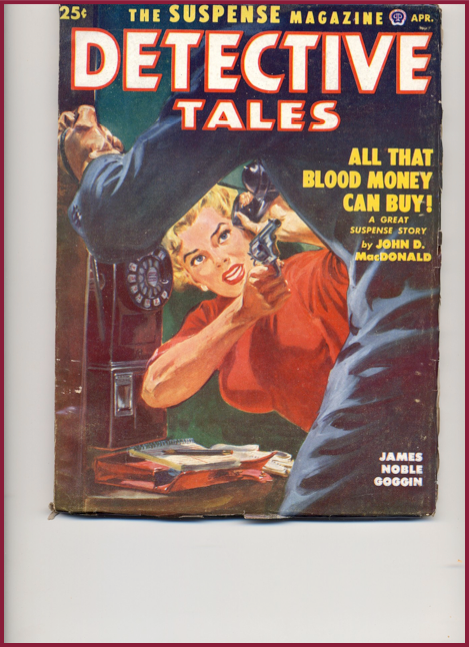
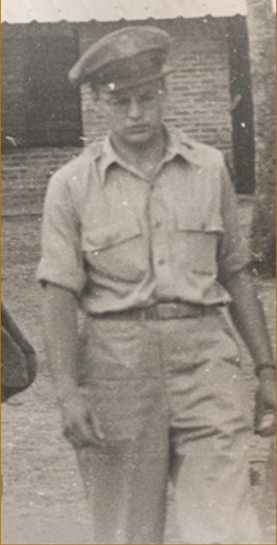
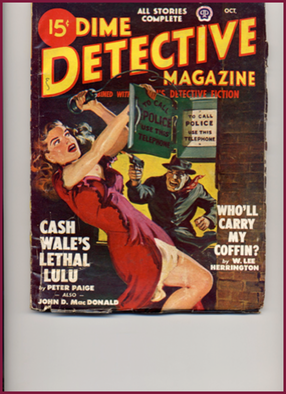
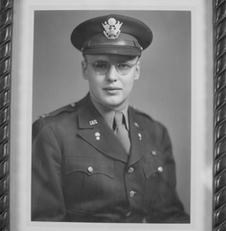
G - Y TITLES
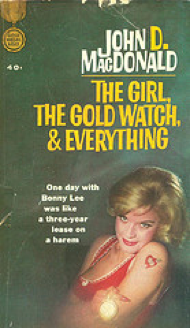
Fawcett: 1962
Somewhere at this moment Bonny Lee and Kirby are driving some one
mad, and enjoying every moment of it.
If you have ever had a yeasty yearning for complete freedom and
complete immunity, you will covet something those two have. This
book will tell you what to look for, and how to use it if you can
steal it.
Best of luck.
In this book, John D. MacDonald turns from suspense to
A story of fantasy . . .
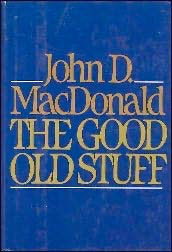
Fawcett: 1982
JDM chose these stories after Francis Nevins and Martin Greenberg, along
Walter ,Jean Shine, and Sam Gowen’s help in assembling them out of
hundreds of short stories he had published in the pulps between 1947 and
1952, at the urging of Nevins and Greenberg, who thought the project would
be very worthwhile. Sales of the collection proved them right.
Table of contents:
“Murder for Money” “ A Time For Dying” “Death Writes the Answer”
“Noose For A Tigress “Miranda” “Murder In Mind”
“They Let Me Live” “Check Out At Dawn “Breathe No More”
“She Cannot Die” “From Some Hidden Grave” “Dead On The Pin”
“ A Trap For The Careless”
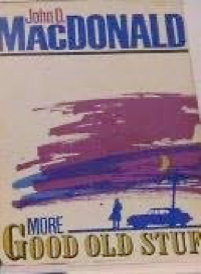
Fawcett: 1984
Sales of The Good Old Stuff proved to be so good that a second collection was published two years later in 1984.
Table of Contents:
“Deadly Damsel” “State Police Report That” “Death For Sale”
“ A Corpse In His Dreams” “I Accuse Myself” “ A Place To Live”
“Neighborly Interest” “The Night Is Over” “Secret Stain”
“Even Up The Odds” “ Verdict” “ The High Grey Walls Of Hate”
“Unmarrried Widow” “You Remember Jeanie”
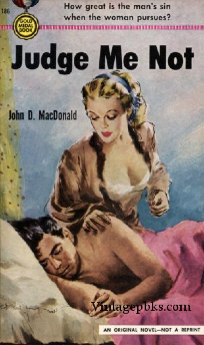
Fawcett: 1951
She turned to face him and all the light had gone out of her blue eyes.
They looked dead, long buried.
"It's only a matter of time," she said. "I know sooner or later you'll ask
me how I became what I am. Men seem to have a compulsion to ask that
question. So let's have a pact. Don't ask me, and you won't make it
necessary or me to invent some tragic story to satisfy your curiosity.
"Just take me for . . . granted," she whispered.
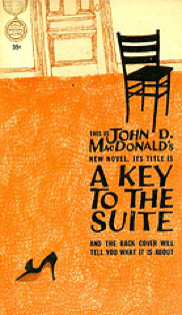
Fawcett: 1962
In this swift and striking novel, John D. MacDonald examines the
ferment of a big-time convention - the plots, the savage
maneuverings, the dreadful ease with which a man or a dream can
be destroyed.
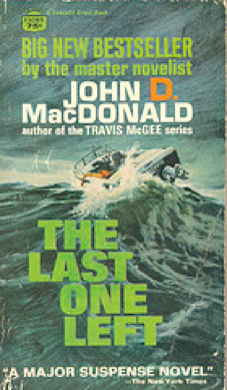
Doubleday: 1966
MURDER AT SEA.
NO SURVIVORS.
NO EVIDENCE.
NO REASON NOT TO BE $800,000 RICHER.
Crissy Harkinson knew all about the cash that had left the Gold
Coast of Florida, headed for the Bahamas on board a pleasure boat.
It was Texas money—unrecorded, intended as a bribe. And there was
enough of it left to change a dozen lives. Or end them . .
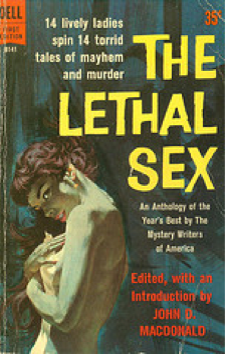
Dell, 1959
Mystery Writers of America anthology, edited, with intro by JDM
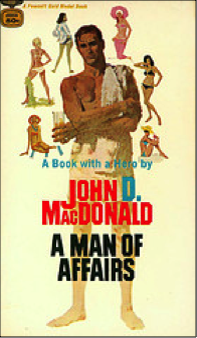
DELL: 1957
LOST WEEKENDS IN THE BAHAMAS SUN—AND BENEATH THE RUM-DAZED SURFACE
OF THE HOUSE-PARTIES RAGED A TITANIC STRUGGLE FOR POWER.
There were enough girls for everyone. And Mike Dean had a use for all of them. He used them as he would his liquor, his sunshine,his hospitality, his own personal magnetism—to take other men's minds off their troubles, to soften their consciences, to muddy their good sense, to bend them to his will.
But one of his house guests refused to see things Mike Dean's way.
One of them had a mind of his his own, and a heart of his own. One of them wouldn't be bought.
He is the Hero of this fascinating behind the scenes novel of corporate power and glory and corruption.
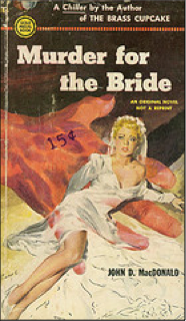
1951 by Fawcett: 1951
"SHE MAY LOOK LIKE AN ANGEL . . . but she's a tramp."
That's when I hit him, my best friend. I thought of Laura and our
three day honeymoon. I thought of the sting of her full lips, the
long, lush lines of her warm, wonderful body, her throaty,
delighted laugh. And I thought of all the nights we were going to
spend together.
Paul had stumbled to his feet, and there was blood on his mouth.
"You need a keeper," he said heavilly and contemptuously. "To save
you from yourself—and her."
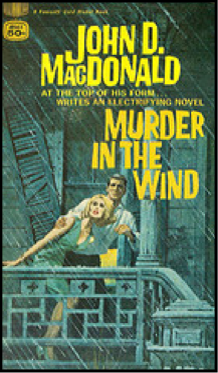
First published 1956 by Dell
Murder In The Wind is, beyond a doubt, one of the most compelling
and suspenseful of Macdonald’s novels. . An awesomely described hurricane
literally drives his fascinating cast of characters together. Their refuge from the
driving wind and rising water become a sort of grand (and grisly) hotel.
(NOTE: WEST COAST FLORIDA RESIDENTS SHOULD READ THIS BOOK--
AND CONDOMINIUM-- EACH SPRING LEST THEY BECOME COMPLACENT....)
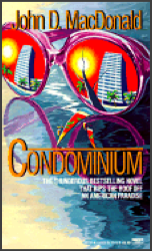
Lippencott: 1977
Welcome to Golden Sands, the dream condominium built on a weak foundation
and a thousand dirty secrets. JDM’s powerful novel is a panoramic look at the
shocking facts of life in a Sun Belt community: the real estate swindles and political
payoffs, the maintenance charges that run up, and the health benefits that run out,
the crack-ups and marital breakdowns, the disaster that awaits those who play in
the path of a hurricane.
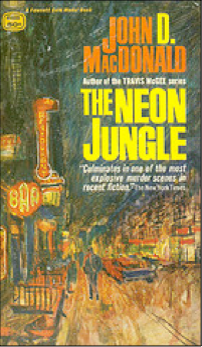
Fawcett: 1953
The smell of stale bedrooms and warm gin hovered over that whole section of town. the women, even the young girls, walked a certain way.
There was a drifting threat of violence everywhere, and the kids of the neighborhood knew all about knives, garrison belts and bicycle chains long before they were pushed into high school by weary truant officers.
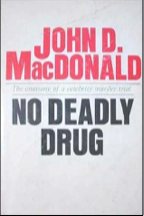
Fawcett 1968
The best-selling author of the Travis McGee novels tells the riveting tru story of the notorious
Coppolino murder trial.
Note: JDM paid tribute to John Pete Zenk who had suggested he write about the trial, and who
worked with JDM “all the way” as JDM noted.
In 1996, as a guest at our 6th John D. MacDonald Conference, in Sarasota, Florida, we heard a
very touching story by John Pete Zenk. The setting was MacDonald’s home, now owned by
a private party, who invited all conferees to have a barbecue lunch on the verandah.
Mr. Zenk told us that in 1985, while he was undergoing a very difficult time, both personally and
medically, and a check for a sizable sum of money appeared out of nowhere--the
explanation was that it was for some”royalties” long overdue from further sales of the book.
There was not a dry eye in the house when Zenk told us that it was not until after JDM’s death
that he found out that the money was simply given by JDM to Zenk under the “guise” of a
royalty payment.
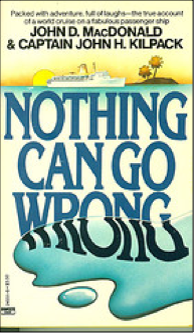
1981 by Harper and Row: 1981
John D. MacDonald & Captain John H. Kilpack
FOR CRUISE VETERANS
FOR ARMCHAIR TRAVELERS
NOTHING CAN GO WRONG . . . But everything does in this exciting
tale of the last long cruise of a U.S. passenger ship by superb
storyteller Captain John H. Kilpack and renowned author John D.
MacDonald.
When the S.S. MARISPOSA set sail in 1977 for a 77-day journey from
San Francisco to Leningrad and back, crazy antics, practical
jokes, human quirks, and an old ship with more than its share of
mechanical troubles created a memorable adventure for everyone
aboard.
This wild tour takes us twice through the Panama Canal, to more
than a dozen European ports, to Alaska, and to sultry Caribbean
isles in a uniquely amusing and entertaining book.
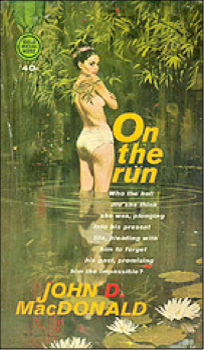
Fawcett: 1963
Who in the hell did she think she was, plunging into his present
life, pleading with him to forget his past, promissing him the
impossible?
Sid Shanley couldn't stay in one place very long. He had to keep
on the run, changing towns, changing jobs, changing women. He
worked out the perfect setup—no attachments, no trails, no
explanations. But now a girl had caught up with him. Her name was
Paula—and a million dollars lay behind her strange invitation . .
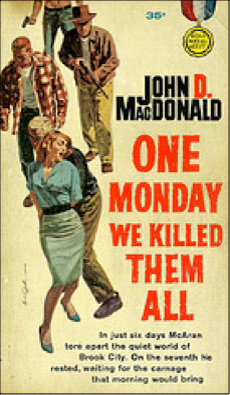
Fawcett: 1961
ARCHITECT OF EVIL
Step by step, Dwight McAran built a wall of vicious hate around
himself.
It was easy. He was a man who could slap one woman to death
because she loved him, and hum a love song to another while he
raped her.
Sure, he did some time in jail. He sat in a cell for five long
years until he harbored a core of stark, steaming evil designed to
explode in a fury of vengeance.
Revenge was all he craved—and a plan was what he had—a plan just
cruel enough to please him, just crazy enough to work.
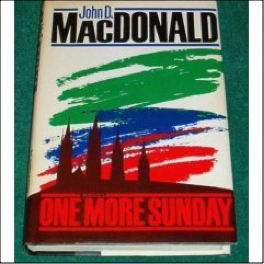
Knopf: 1984
Remember all those televangelist scandals in the late 80’s ?
JDM wrote this book years before.....prescient as usual...

Fawcett 1960
SHE WOULD NEVER ESCAPE HER PAST--HER FATE TO BE CAUGHT FOREVER IN THE SICK GLITTER OF THE GREAT SUCKER TRAP.
Coney Island in the desert. Miami Beach with an ocean. Nothing but sand and neon and money, money, everywhere. Big-name entertainers rubbing elbows with big name ganGsters over the green-baize craps tables.
Bare-breasted showgirls conning the big spenders in the small hours. All-night marriage chapels......Little white balls bouncing around all the roulette wheels....
World without end....
VEGAS!!!!
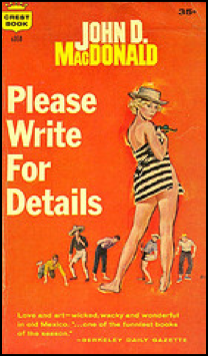
Simon and Schuster: 1959
ART, EROTICA, AND TEQUILA
When a jaded exponent of the Fast Buck hitches his starload of
schemes to the salacious bent of a well-heeled, well-oiled
divorcee, the result is a daffy mail-ordered Mexican art colony
known as the Cuernavaca Summer Workshop.
The unique goings-on and comings-off of the members of this
oddball establishment are the stuff a he-mans dreams are made of.
It is a positively no-money-back, uninhibited, unabridged romp
through passion and Picasso, under the naked Mexican sun, where
East meets West, North meets South, Madison Avenue goes native,
and the long-stemmed Texas lovelies unveil their astonishing
natural equipment in the hallowed name of Culture.
(NOTE: A REALLY “FUN “ READ)
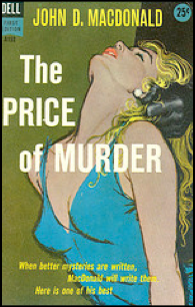
Dell: 1957
She was so alive and he needed her so badly there was nothing to
do but kill her . . .
Lippencott: 1977
Welcome to Golden Sands, the dream condominium built on a weak foundation
and a thousand dirty secrets. JDM’s powerful novel is a panoramic look at the
shocking facts of life in a Sun Belt community: the real estate swindles and political
payoffs, the maintenance charges that run up, and the health benefits that run out,
the crack-ups and marital breakdowns, the disaster that awaits those who play in
the path of a hurricane.

DELL: 1957
LOST WEEKENDS IN THE BAHAMAS SUN—AND BENEATH THE RUM-DAZED SURFACE
OF THE HOUSE-PARTIES RAGED A TITANIC STRUGGLE FOR POWER.
There were enough girls for everyone. And Mike Dean had a use for all of them. He used them as he would his liquor, his sunshine,his hospitality, his own personal magnetism—to take other men's minds off their troubles, to soften their consciences, to muddy their good sense, to bend them to his will.
But one of his house guests refused to see things Mike Dean's way.
One of them had a mind of his his own, and a heart of his own. One of them wouldn't be bought.
He is the Hero of this fascinating behind the scenes novel of corporate power and glory and corruption.

1951 by Fawcett: 1951
"SHE MAY LOOK LIKE AN ANGEL . . . but she's a tramp."
That's when I hit him, my best friend. I thought of Laura and our
three day honeymoon. I thought of the sting of her full lips, the
long, lush lines of her warm, wonderful body, her throaty,
delighted laugh. And I thought of all the nights we were going to
spend together.
Paul had stumbled to his feet, and there was blood on his mouth.
"You need a keeper," he said heavilly and contemptuously. "To save
you from yourself—and her."

First published 1956 by Dell
Murder In The Wind is, beyond a doubt, one of the most compelling
and suspenseful of Macdonald’s novels. . An awesomely described hurricane
literally drives his fascinating cast of characters together. Their refuge from the
driving wind and rising water become a sort of grand (and grisly) hotel.
(NOTE: WEST COAST FLORIDA RESIDENTS SHOULD READ THIS BOOK--
AND CONDOMINIUM-- EACH SPRING LEST THEY BECOME COMPLACENT....)

Lippencott: 1977
Welcome to Golden Sands, the dream condominium built on a weak foundation
and a thousand dirty secrets. JDM’s powerful novel is a panoramic look at the
shocking facts of life in a Sun Belt community: the real estate swindles and political
payoffs, the maintenance charges that run up, and the health benefits that run out,
the crack-ups and marital breakdowns, the disaster that awaits those who play in
the path of a hurricane.

Fawcett: 1953
The smell of stale bedrooms and warm gin hovered over that whole section of town. the women, even the young girls, walked a certain way.
There was a drifting threat of violence everywhere, and the kids of the neighborhood knew all about knives, garrison belts and bicycle chains long before they were pushed into high school by weary truant officers.

Fawcett 1968
The best-selling author of the Travis McGee novels tells the riveting tru story of the notorious
Coppolino murder trial.
Note: JDM paid tribute to John Pete Zenk who had suggested he write about the trial, and who
worked with JDM “all the way” as JDM noted.
In 1996, as a guest at our 6th John D. MacDonald Conference, in Sarasota, Florida, we heard a
very touching story by John Pete Zenk. The setting was MacDonald’s home, now owned by
a private party, who invited all conferees to have a barbecue lunch on the verandah.
Mr. Zenk told us that in 1985, while he was undergoing a very difficult time, both personally and
medically, and a check for a sizable sum of money appeared out of nowhere--the
explanation was that it was for some”royalties” long overdue from further sales of the book.
There was not a dry eye in the house when Zenk told us that it was not until after JDM’s death
that he found out that the money was simply given by JDM to Zenk under the “guise” of a
royalty payment.

1981 by Harper and Row: 1981
John D. MacDonald & Captain John H. Kilpack
FOR CRUISE VETERANS
FOR ARMCHAIR TRAVELERS
NOTHING CAN GO WRONG . . . But everything does in this exciting
tale of the last long cruise of a U.S. passenger ship by superb
storyteller Captain John H. Kilpack and renowned author John D.
MacDonald.
When the S.S. MARISPOSA set sail in 1977 for a 77-day journey from
San Francisco to Leningrad and back, crazy antics, practical
jokes, human quirks, and an old ship with more than its share of
mechanical troubles created a memorable adventure for everyone
aboard.
This wild tour takes us twice through the Panama Canal, to more
than a dozen European ports, to Alaska, and to sultry Caribbean
isles in a uniquely amusing and entertaining book.

Fawcett: 1963
Who in the hell did she think she was, plunging into his present
life, pleading with him to forget his past, promissing him the
impossible?
Sid Shanley couldn't stay in one place very long. He had to keep
on the run, changing towns, changing jobs, changing women. He
worked out the perfect setup—no attachments, no trails, no
explanations. But now a girl had caught up with him. Her name was
Paula—and a million dollars lay behind her strange invitation . .

Fawcett: 1961
ARCHITECT OF EVIL
Step by step, Dwight McAran built a wall of vicious hate around
himself.
It was easy. He was a man who could slap one woman to death
because she loved him, and hum a love song to another while he
raped her.
Sure, he did some time in jail. He sat in a cell for five long
years until he harbored a core of stark, steaming evil designed to
explode in a fury of vengeance.
Revenge was all he craved—and a plan was what he had—a plan just
cruel enough to please him, just crazy enough to work.

Knopf: 1984
Remember all those televangelist scandals in the late 80’s ?
JDM wrote this book years before.....prescient as usual...

Fawcett 1960
SHE WOULD NEVER ESCAPE HER PAST--HER FATE TO BE CAUGHT FOREVER IN THE SICK GLITTER OF THE GREAT SUCKER TRAP.
Coney Island in the desert. Miami Beach with an ocean. Nothing but sand and neon and money, money, everywhere. Big-name entertainers rubbing elbows with big name ganGsters over the green-baize craps tables.
Bare-breasted showgirls conning the big spenders in the small hours. All-night marriage chapels......Little white balls bouncing around all the roulette wheels....
World without end....
VEGAS!!!!

Simon and Schuster: 1959
ART, EROTICA, AND TEQUILA
When a jaded exponent of the Fast Buck hitches his starload of
schemes to the salacious bent of a well-heeled, well-oiled
divorcee, the result is a daffy mail-ordered Mexican art colony
known as the Cuernavaca Summer Workshop.
The unique goings-on and comings-off of the members of this
oddball establishment are the stuff a he-mans dreams are made of.
It is a positively no-money-back, uninhibited, unabridged romp
through passion and Picasso, under the naked Mexican sun, where
East meets West, North meets South, Madison Avenue goes native,
and the long-stemmed Texas lovelies unveil their astonishing
natural equipment in the hallowed name of Culture.
(NOTE: A REALLY “FUN “ READ)

Dell: 1957
She was so alive and he needed her so badly there was nothing to
do but kill her . . .
Lippencott: 1977
Welcome to Golden Sands, the dream condominium built on a weak foundation
and a thousand dirty secrets. JDM’s powerful novel is a panoramic look at the
shocking facts of life in a Sun Belt community: the real estate swindles and political
payoffs, the maintenance charges that run up, and the health benefits that run out,
the crack-ups and marital breakdowns, the disaster that awaits those who play in
the path of a hurricane.

DELL: 1957
LOST WEEKENDS IN THE BAHAMAS SUN—AND BENEATH THE RUM-DAZED SURFACE
OF THE HOUSE-PARTIES RAGED A TITANIC STRUGGLE FOR POWER.
There were enough girls for everyone. And Mike Dean had a use for all of them. He used them as he would his liquor, his sunshine,his hospitality, his own personal magnetism—to take other men's minds off their troubles, to soften their consciences, to muddy their good sense, to bend them to his will.
But one of his house guests refused to see things Mike Dean's way.
One of them had a mind of his his own, and a heart of his own. One of them wouldn't be bought.
He is the Hero of this fascinating behind the scenes novel of corporate power and glory and corruption.

1951 by Fawcett: 1951
"SHE MAY LOOK LIKE AN ANGEL . . . but she's a tramp."
That's when I hit him, my best friend. I thought of Laura and our
three day honeymoon. I thought of the sting of her full lips, the
long, lush lines of her warm, wonderful body, her throaty,
delighted laugh. And I thought of all the nights we were going to
spend together.
Paul had stumbled to his feet, and there was blood on his mouth.
"You need a keeper," he said heavilly and contemptuously. "To save
you from yourself—and her."

First published 1956 by Dell
Murder In The Wind is, beyond a doubt, one of the most compelling
and suspenseful of Macdonald’s novels. . An awesomely described hurricane
literally drives his fascinating cast of characters together. Their refuge from the
driving wind and rising water become a sort of grand (and grisly) hotel.
(NOTE: WEST COAST FLORIDA RESIDENTS SHOULD READ THIS BOOK--
AND CONDOMINIUM-- EACH SPRING LEST THEY BECOME COMPLACENT....)

Lippencott: 1977
Welcome to Golden Sands, the dream condominium built on a weak foundation
and a thousand dirty secrets. JDM’s powerful novel is a panoramic look at the
shocking facts of life in a Sun Belt community: the real estate swindles and political
payoffs, the maintenance charges that run up, and the health benefits that run out,
the crack-ups and marital breakdowns, the disaster that awaits those who play in
the path of a hurricane.

Fawcett: 1953
The smell of stale bedrooms and warm gin hovered over that whole section of town. the women, even the young girls, walked a certain way.
There was a drifting threat of violence everywhere, and the kids of the neighborhood knew all about knives, garrison belts and bicycle chains long before they were pushed into high school by weary truant officers.

Fawcett 1968
The best-selling author of the Travis McGee novels tells the riveting tru story of the notorious
Coppolino murder trial.
Note: JDM paid tribute to John Pete Zenk who had suggested he write about the trial, and who
worked with JDM “all the way” as JDM noted.
In 1996, as a guest at our 6th John D. MacDonald Conference, in Sarasota, Florida, we heard a
very touching story by John Pete Zenk. The setting was MacDonald’s home, now owned by
a private party, who invited all conferees to have a barbecue lunch on the verandah.
Mr. Zenk told us that in 1985, while he was undergoing a very difficult time, both personally and
medically, and a check for a sizable sum of money appeared out of nowhere--the
explanation was that it was for some”royalties” long overdue from further sales of the book.
There was not a dry eye in the house when Zenk told us that it was not until after JDM’s death
that he found out that the money was simply given by JDM to Zenk under the “guise” of a
royalty payment.

1981 by Harper and Row: 1981
John D. MacDonald & Captain John H. Kilpack
FOR CRUISE VETERANS
FOR ARMCHAIR TRAVELERS
NOTHING CAN GO WRONG . . . But everything does in this exciting
tale of the last long cruise of a U.S. passenger ship by superb
storyteller Captain John H. Kilpack and renowned author John D.
MacDonald.
When the S.S. MARISPOSA set sail in 1977 for a 77-day journey from
San Francisco to Leningrad and back, crazy antics, practical
jokes, human quirks, and an old ship with more than its share of
mechanical troubles created a memorable adventure for everyone
aboard.
This wild tour takes us twice through the Panama Canal, to more
than a dozen European ports, to Alaska, and to sultry Caribbean
isles in a uniquely amusing and entertaining book.

Fawcett: 1963
Who in the hell did she think she was, plunging into his present
life, pleading with him to forget his past, promissing him the
impossible?
Sid Shanley couldn't stay in one place very long. He had to keep
on the run, changing towns, changing jobs, changing women. He
worked out the perfect setup—no attachments, no trails, no
explanations. But now a girl had caught up with him. Her name was
Paula—and a million dollars lay behind her strange invitation . .

Fawcett: 1961
ARCHITECT OF EVIL
Step by step, Dwight McAran built a wall of vicious hate around
himself.
It was easy. He was a man who could slap one woman to death
because she loved him, and hum a love song to another while he
raped her.
Sure, he did some time in jail. He sat in a cell for five long
years until he harbored a core of stark, steaming evil designed to
explode in a fury of vengeance.
Revenge was all he craved—and a plan was what he had—a plan just
cruel enough to please him, just crazy enough to work.

Knopf: 1984
Remember all those televangelist scandals in the late 80’s ?
JDM wrote this book years before.....prescient as usual...

Fawcett 1960
SHE WOULD NEVER ESCAPE HER PAST--HER FATE TO BE CAUGHT FOREVER IN THE SICK GLITTER OF THE GREAT SUCKER TRAP.
Coney Island in the desert. Miami Beach with an ocean. Nothing but sand and neon and money, money, everywhere. Big-name entertainers rubbing elbows with big name ganGsters over the green-baize craps tables.
Bare-breasted showgirls conning the big spenders in the small hours. All-night marriage chapels......Little white balls bouncing around all the roulette wheels....
World without end....
VEGAS!!!!

Simon and Schuster: 1959
ART, EROTICA, AND TEQUILA
When a jaded exponent of the Fast Buck hitches his starload of
schemes to the salacious bent of a well-heeled, well-oiled
divorcee, the result is a daffy mail-ordered Mexican art colony
known as the Cuernavaca Summer Workshop.
The unique goings-on and comings-off of the members of this
oddball establishment are the stuff a he-mans dreams are made of.
It is a positively no-money-back, uninhibited, unabridged romp
through passion and Picasso, under the naked Mexican sun, where
East meets West, North meets South, Madison Avenue goes native,
and the long-stemmed Texas lovelies unveil their astonishing
natural equipment in the hallowed name of Culture.
(NOTE: A REALLY “FUN “ READ)

Dell: 1957
She was so alive and he needed her so badly there was nothing to
do but kill her . . .
Lippencott: 1977
Welcome to Golden Sands, the dream condominium built on a weak foundation
and a thousand dirty secrets. JDM’s powerful novel is a panoramic look at the
shocking facts of life in a Sun Belt community: the real estate swindles and political
payoffs, the maintenance charges that run up, and the health benefits that run out,
the crack-ups and marital breakdowns, the disaster that awaits those who play in
the path of a hurricane.
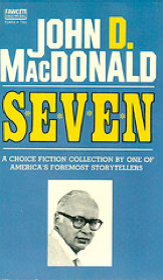
Gold Medal: 1971
Contains the following short stories:
"The Random Noise of Love" "Dear Old Friend" "The Willow Pool"
"Quarrel" "Woodchuck" "Double Hannenframmis" "The Annex"
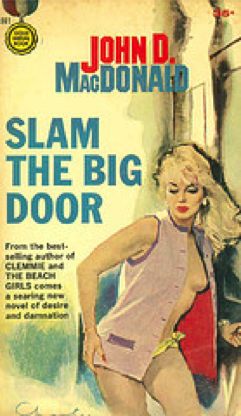
Fawcett: 1960
Beneath the relaxed exterior of their lush beach life, the year
round sun tans, the unmeasured cocktails, the casual embraces
there pulses an insistent, blood-warm note of violence, of
unspeakable desire.
Before the story is done, the pulse has run wild.
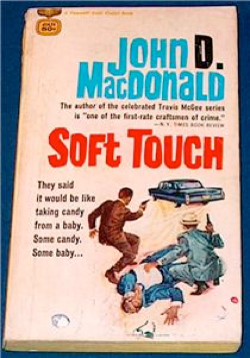
DELL: 1958
HE WANTED OUT.
Out of his job, out of his marriage to a well-heeled lush. And
there'd never be another chance like this one.
A big, big caper, but simple as pie. A suitcase bursting with
tightly packed stacks of nice, worn, unmarked bills. And nobody
would get hurt - supposedly.
But the sight and feel of all that money can warp a man, can make
him decide not to split it up. And it can make murder look easy.
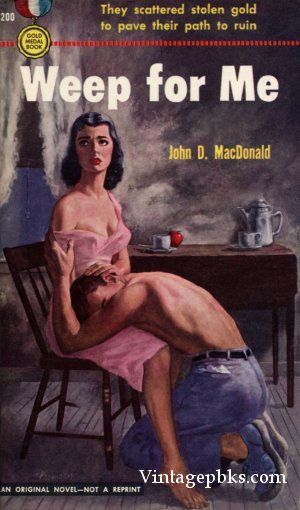
Fawcett: 1951
Emily was demure, beautiful. Only she loved money as other women love men.
To satisfy her craving, she seduced Kyle Cameron,drained from him his manhood, his
morals and his soul. . .
(Note: JDM wished he could have bought all copies of this book so he could burn them...
not his best effort--and rare to find).
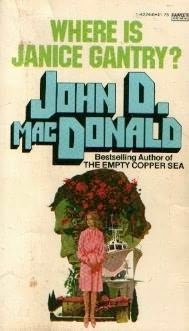
Fawcett: 1961
A lonely cottage on an empty Florida Key
An escaped convict
The woman who took fatal pity on him
A wealthy man who lives in - retirement
His alcoholic wife, a prisoner behind drawn blinds
An ex pro-football player who thought he'd lost his nerve
A lone girl on a deserted beach
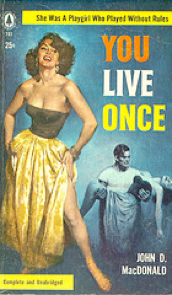
Popular Library: 1956
Clint Sewell knew there wasn't a wife within fifty miles who
didn't have reason to kill Mary Olan - because there wasn't a
husband around who didn't think the grass was greener in Mary
Olan's bedroom. The latest occupant was Clint's boss, a nice guy,
but not above deceiving his wife - and maybe not above letting
Clint be the patsy when the fabulous Mary Olan was found dead in a
closet, with Clint Sewell's belt around her lovely neck.
Published AGAIN IN 1961 AS
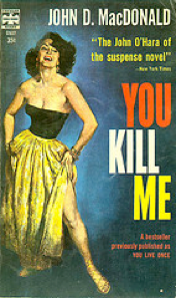
A - F TITLES
SUMMARIES AND REVIEWS OF JDM NOVELS
What follows on the next several pages is a look at the books, in alphabetical order, with the “blurb” from the back cover of each book. In a few cases I have added a somewhat critical and philosophical overview of the novel.
These reviews are being done as the spirit moves me, but it will be completed at some point.
Since one problem is not revealing the "ending" of a book I have chosen to comment on the skeleton of the plot and the impact of the book as a whole to me. I am on my 6th or 7th re-reading of most of the books, a process covering much of the past 40 years.
If you've read a particular book and want to share some thoughts just email me at
I’ve heard from D.R. Martin, who is more than an avid reader, and who has a blog devoted to discussing the McGee novels. Go to this site for more information:
http://drmar120.wordpress.com/say-hello-to-travis-mcgee/
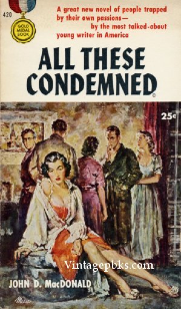
Fawcett: 1954
SHE WOULD HAUNT ME FOREVER. . .
She had taken all I had - using the weapons of her money and her
demanding hunger for a new man to make me into something less than
a man. She had condemned everybody who had loved her to a lifetime
of shame and self-hatred.
But someone stronger than I had turned on her, killed her, and
thrown that tantalizing body into the cold lake.
And now all of us were free at last . . . or were we?
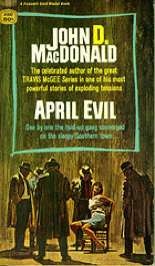
Dell: 1956
THE STAGE WAS SET Harry Mullin hit town first. Harry had
just made the F.B.I.'s Ten Most Wanted list, and he was a
little nervous about being seen With him at the rented
house from which they planned to case the job.
With him was a girl named Sal, who had fallen into the
easy sluttish rut of being a good woman to a bad man . . .
Then Ace turned up. The Ace had been very good in his
day, but he was going a little to flab, and maybe he
had lost something in the guts department . . .
The last one into town was Ronnie. Ronnie had killed
twelve men and two women in the past seven years,
and had gotten to like his job - maybe a little too much .
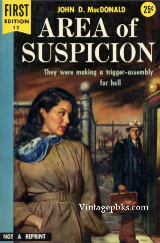
Dell: 1954
My brother's wife.
Weaver of black magic stained with blood.
Temptress who haunted my restless nights.
Wife gloriously beautiful in her widow's weeds.
Woman I still wanted with the craving of the damned.
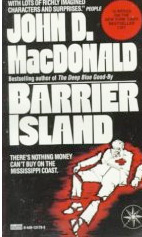
Hodder and Stoughton: 1986
There are two kinds of men in Mississippi. The make natural
enemies. And sometimes, but only if the balance between strength
and weakness tips too far, unnatural allies.
Tucker Loomis is a hard and dangerous man with a ruthlessness all
West Bay fears and respects, and an improbable amount of money.
Wade Rowley is a common man who aspires to honor but gets caught
up in the footwork of a skilled swindler.
In a pitiless game with a few harsh rules and just one way of
keeping score, the wrong man will die and another will get away
with more than murder.
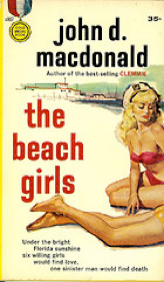
First published 1959 Fawcett
SURE, LEO RICE WAS A NICE GUY . . .
But why did he choose our beach? He could have gone ten miles up
the strip and all of us could have lived happily ever after - with
no questions asked.
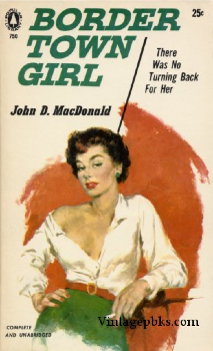
1956 by Popular Library: 1965
TWO HEADLONG TALES OF INTRIGUE, SUSPENSE, AND MURDER
BY A MASTER STORYTELLER:
BORDER TOWN GIRL
Once, Lane Sanson had been a Somebody - a war correspondent and a
best-selling author. Now he was a nobody, bumming around Mexico.
Lost, lonely, hungry for hope, he was a pushover for a border town
B-girl - the perfect fall guy for a lethal frame-up.
LINDA
She was born with the morality gene missing. As beautiful, as
inviting, as treacherous as the sea around her, Linda is one of
the most compelling women yet created by John D. MacDonald.
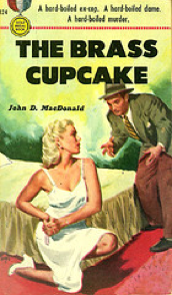
FAWCETT: 1950
Take a hard-boiled ex-cop named Cliff Bartells.
Take a beautiful girl with the unlikely name of Melody Chance.
Take the death of of one Elizabeth Stegman of Boston,
Massachusetts.
Take her missing jewels insured for seven hundred and fifty
thousand dollars.
Add them all up and what have you got? Murder for profit. Cold
blooded, premeditated murder . . .
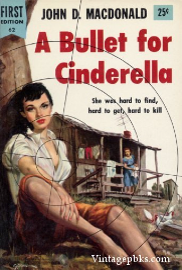
Dell: 1955
HER VENEER WAS BIG CITY . . .
But one look and you knew that Toni Raselle's instincts were
straight out of the river shack she came from.
I watched her as she toyed with the man, laughing, her tumbled
hair like raw blue-black silk, her brown shoulders bare. Eyes
deep-set, a girl with a gypsy look.
So this was the girl I had risked my life to find. This was the
girl who was going to lead me to a buried fortune in stolen loot.
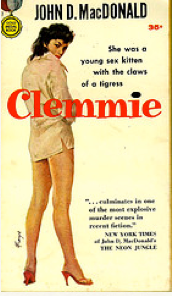
Fawcett: 1958
She was very young. She was dangerous.
She was a girl who lived too close to the edge of violence.
She hunted trouble. She was an exhibitionist, a body-worshipper, a
sensualist.
She was without morals, scruples, ethics. She was beautiful.
She was CLEMMIE . . .
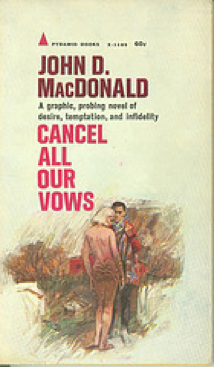
Appleton-Century Crofts: 1953
FOR FIFTEEN YEARS THEY HAD BEEN MARRIED.
Fletcher and Jane Wyant. They had built a perfect marriage - -two wonderful kids,
a beautiful home, their own private never-ending love affair.
Fletcher thought he knew Jane completely. No dark secrets. No
hidden past.
Then one hot summer week everything changed. And suddenly,
brutally, Jane became a cold stranger.
CANCEL ALL OUR VOWS is a vivid, shocking novel of lawless love and
shattering desires - -desires that bring men and women to the
brink of disaster.

Lippencott: 1977
Welcome to Golden Sands, the dream condominium built on a weak foundation
and a thousand dirty secrets. JDM’s powerful novel is a panoramic look at the
shocking facts of life in a Sun Belt community: the real estate swindles and political
payoffs, the maintenance charges that run up, and the health benefits that run out,
the crack-ups and marital breakdowns, the disaster that awaits those who play in
the path of a hurricane.
(Note: read this and Murder In The Wind and you just might stay away from Florida during Hurricane season.)
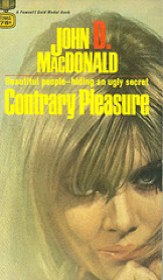
Appleton-Century: 1954
EVIL CASTS A LONG SHADOW . . .
and touches the innocent along with the guilty in this powerful,
probing novel of a family who can no longer hide from the world or
each other.
For years the Delevan image reflected only the best of everything
- wealth, position, influence, and the kind of expensive good
looks that takes generations to cultivate.
No one dared suspect that their glittering facade, their cherished
privacy masked hidden lusts, furtive pleasures, and twisted dreams
which would soon erupt into a pattern of strange violence that
threatened to destroy them all.
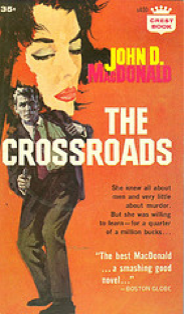
Simon and Schuster: 1959
Anton Drovek started The Crossroads Corporation forty years ago
with a shack and a petrol pump. Now it is a flourishing,
still-expanding motel.
The endless stream of trucks and cars, Maine-to-Florida and back,
stop here while their drivers eat, sleep, fill up and roll on.
'The crossroads is a smoothly managed oasis for the hungry
motorist and tired trucker. It's a booming little city, owned and
run by the tightly-knit, hard-driving Drovek family.
But all is not smooth beneath the surface. Sylvia, Peter Drovek's
wife, tells a young employee how he can steal Papa Drovek's
$200,000 in cash, though she doesn't mention that it is someone
else's cold, calculating plan.
None of the three persons who execute the robbery knows all that
the other two have in mind. The reader knows more than any of
them, but even he can't foresee the final violent explosion - an
ending which for some of the Droveks is a new beginning.
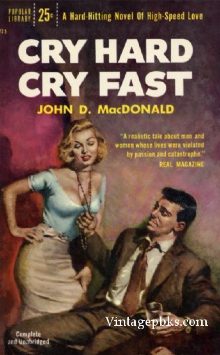
Popular Library: 1955
A GUNMAN ON THE RUN
A SIXTEEN-YEAR-OLD CHICK
A USED-UP B-GIRL
A GUILT-STRICKEN WIDOWER
A LEFTOVER MISTRESS
ALL ZEROING IN ON - A ROUTE TO SUDDEN DEATH
A shattering six-car smashup is the explosive core of this head-long story.
In typical MacDonald fashion, we are introduced to a fascinating cast of characters
and shown what happens to them inside and out, before, during, and after the crash.
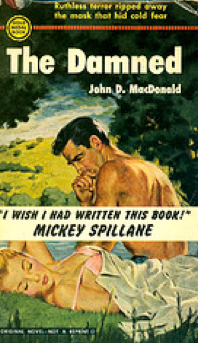
1952 by Fawcett
THE HEAT HIT THEM ALL . . .
the scorching heat of Mexico, and it ate at their nerves. The
stalled ferry held them in the heat until they could stand no
more.
The honeymooners fought, and loved and fought again. The
pretty little tramp clawed her married lover's eyes. The
trembling killer looked behind and knew his time was short.
There were others waiting, too, some good, some bad, but all
of them tormented by the shape of disaster to come.
Time gave them all a second chance.
Most of them stepped on the face of time.
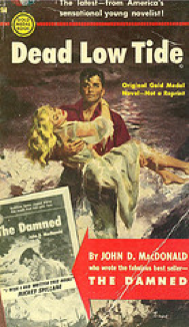
1953 Fawcett
Set in Florida. It is the story of McClintock, a bitter man who
has taken refuge on the keys and shut away the world that had
scarred him.
But the world came after him—in the shape of a manic killer
who threatene McClintock's house of cards and taught him
how to love again.
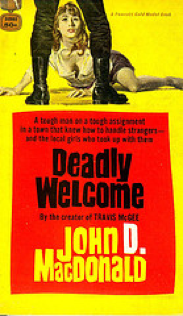
Dell : 1959
Ramona Beach, Florida, was a dangerous place to mix
business with pleasure. Strangers usually meant
trouble, and the local sheriff echoed the town's
sentiments with a blackjack.
Once Ramona Beach had been my home, as a kid--but
now they'd railroaded me out of town. "Can't trust trash,"
they said. I'd never been back.
But that was then and this was now. Now I'd been sent
home by my employer, the Defense Department, to locate
a particular scientist and bring him back alive. But
Ramona Beach had a long memory, and
so did I . . .
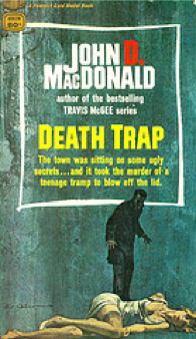
Dell: 1957
In life, Jane Ann never had much use for a halo, but
in her violent death she finally earned one.
When they found a suspect, everyone relaxed, except me.
Maybe I should have stayed out of it, but I owed a big
debt to the patsy they were sending to the electric chair in
a week.
And I would have stayed out of it if I'd known what my
own chances were of coming out alive.
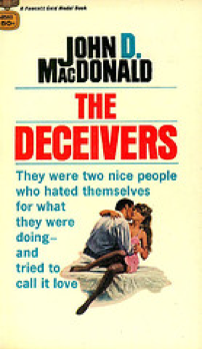
Dell: 1958
A Stunning Novel of Modern Morals
Her name was Cindy, and she was his neighbor's wife - the
woman next door in the kind of suburbia that didn't make
headlines. No cheap scandals here - no wife-swapping, no
key games. These were real people, nice people like Cindy
and Cark who fought with the desperation of the damned to
keep from wanting each other.
Had a perfect opportunity not presented itself, perhaps
nothing would have happened. But suddenly it was the right
time, the right place. And there was no room left for
pretense.
In that moment, all innocence drained out of their lives. Two
real people, two nice people, became creatures of passion -
and guilt.
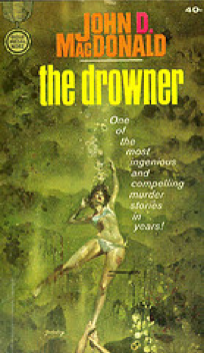
Fawcett: 1963
Lucille Hanson had rid herself of the wrong man - her rich
husband who lived casually and loved carelessly. Then she
found another man she hoped would be right. She was
putting together the pieces of her life - determined not to
make the old mistakes, the foolish ones which had almost
wrecked her the first time around - until all of her hopes
came to rest at the bottom of a lake where her body was
found. It must have been an accident, was what others
wanted to think. But among her mourners just one person
refused to believe it was anything but murder.

1952 by Fawcett
THE HEAT HIT THEM ALL . . .
the scorching heat of Mexico, and it ate at their nerves. The
stalled ferry held them in the heat until they could stand no
more.
The honeymooners fought, and loved and fought again. The
pretty little tramp clawed her married lover's eyes. The
trembling killer looked behind and knew his time was short.
There were others waiting, too, some good, some bad, but all
of them tormented by the shape of disaster to come.
Time gave them all a second chance.
Most of them stepped on the face of time.

1953 Fawcett
Set in Florida. It is the story of McClintock, a bitter man who
has taken refuge on the keys and shut away the world that had
scarred him.
But the world came after him—in the shape of a manic killer
who threatene McClintock's house of cards and taught him
how to love again.

Dell : 1959
Ramona Beach, Florida, was a dangerous place to mix
business with pleasure. Strangers usually meant
trouble, and the local sheriff echoed the town's
sentiments with a blackjack.
Once Ramona Beach had been my home, as a kid--but
now they'd railroaded me out of town. "Can't trust trash,"
they said. I'd never been back.
But that was then and this was now. Now I'd been sent
home by my employer, the Defense Department, to locate
a particular scientist and bring him back alive. But
Ramona Beach had a long memory, and
so did I . . .

Dell: 1957
In life, Jane Ann never had much use for a halo, but
in her violent death she finally earned one.
When they found a suspect, everyone relaxed, except me.
Maybe I should have stayed out of it, but I owed a big
debt to the patsy they were sending to the electric chair in
a week.
And I would have stayed out of it if I'd known what my
own chances were of coming out alive.

Dell: 1958
A Stunning Novel of Modern Morals
Her name was Cindy, and she was his neighbor's wife - the
woman next door in the kind of suburbia that didn't make
headlines. No cheap scandals here - no wife-swapping, no
key games. These were real people, nice people like Cindy
and Cark who fought with the desperation of the damned to
keep from wanting each other.
Had a perfect opportunity not presented itself, perhaps
nothing would have happened. But suddenly it was the right
time, the right place. And there was no room left for
pretense.
In that moment, all innocence drained out of their lives. Two
real people, two nice people, became creatures of passion -
and guilt.

Fawcett: 1963
Lucille Hanson had rid herself of the wrong man - her rich
husband who lived casually and loved carelessly. Then she
found another man she hoped would be right. She was
putting together the pieces of her life - determined not to
make the old mistakes, the foolish ones which had almost
wrecked her the first time around - until all of her hopes
came to rest at the bottom of a lake where her body was
found. It must have been an accident, was what others
wanted to think. But among her mourners just one person
refused to believe it was anything but murder.
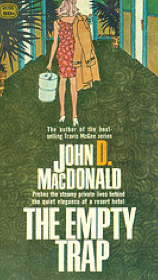
Popular Library: 1957
Lloyd Wescott was a big boy, and he knew that big money doesn't smell like roses. When he was hired to build and run the Green Oasis, he didn't have to ask the pedigree of its owner or where the backing came from. He didn't care, as long as the place was legit and he could run it clean as a whistle.
But just try to whistle when the Big Man moves in, when skimming is the least of what's going on in the casino, when the quiet luxury is crawling with contract guns, and when a soft, beautifulwoman - beaten to within an inch of her life - looks at you with love and fear and the desperate longing to escape . . .
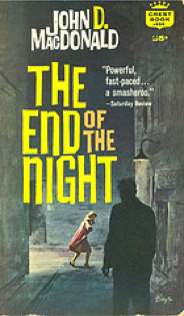
First published 1960 by Simon and Schuster
THE WOLF PACK MURDERS
Three men and a beautiful girl on a cross-country terror spree - a coast-to-coast rampage of stealing, kidnapping, rape and killing.
Who were they? Where did they come from? Why did they do it? Who were their victims?
With chilling detail John D. MacDonald unwraps the grotesque inner world of these four drug-crazed young sadists and brings into terrifying focus those random, violent lusts that lie hidden between mischief and madness - waiting unseen for some innocent and helpless stranger at THE END OF THE NIGHT.
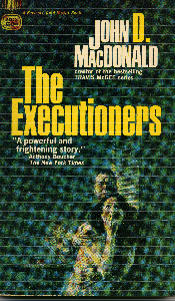
The first edition in 1957 by Fawcett brought great reviews. It was later re-issued under the title of Cape Fear, and the film version with Gregory Peck and Robert Mitchum was very successful. Most JDM fans prefer this film to that released in the 90’s with Robert DeNiro playing the villain.
Max Cady has spent 14 years in a cell, plotting his revenge against the man who put him there, attorney Sam Bowden. Bowden’s teen-aged daughter may be the way Cady achieves his evil aim. There is a great deal of tension which is built by way of MacDonald’s skill in writing. Cady’s pursuit of the daughter is quite chilling. This is one of JDM’s best novels.
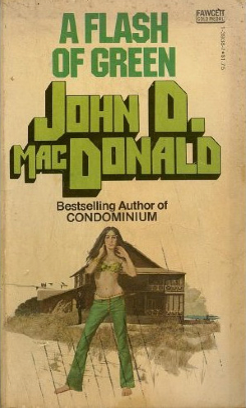
1962 by Simon and
Schuster
A GRIPPING NOVEL OF SMALL-TOWN CORRUPTION AND TWO PEOPLE WHO FIGHT IT.
Jimmy Wing was only trying to help his friend's
widow. At leasT that's what he told himself after
he warned Kate Hubble that the beautiful bay that
she and her neighbors had struggled to save was
now going to be sold to developers. He knew he
shouldn't have told her anything. He was a
reporter, trained to reveal nothing. But he
was falling in love with her.
The corruptors had taken over Palm City. Silent
and deadly like the snakes that infested the nearby
swamps, they lay hidden from view, waiting for
the right moment to strike. Political treachery
and private greed had already softened up the
town for the big sell-out.
All that had to be done now was to silence a few
stubborn citizens. Kate Hubble was one of them and
blackmail was their favorite weapon.
Note: This is often cited by readers as being a MacDonald favorite.
Also, it was adapted and directed by Victor Nunez into a film, in 1984.
JDM visited the film location one day and apparently felt that Nunez’ interpretation was very close to what he had in mind when writing the novel.
TRAVIS MCGEE NOVELS: 1-21
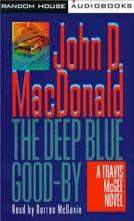
The Deep Blue Goodbye* (Fawcett Gold Medal , April 1964)
Covering a period of time between July 24, and November, 1962.
(Originally named Dallas McGee, the name of MacDonald's hero was changed after President Kennedy's assassination. In the first of the McGee novels we are introduced to this 6”4” hero, whose business card reads: Travis McGee: Salvage Consultant . McGee undertakes to recover for its rightful owner money or property of which the owner has been wrongfully deprived and has no other hope of recovering, taking half its value as his fee.
McGee is a bachelor, a man who can be friends with the ladies as well as have a passion for them.
He is a principled man, although they are somewhat at the mercy of his uncertain emotional condition and his circumstances at the moment; In McGee's own words, "Some of them I'll bend way, way, over, but not break."
His place of residence, is the Busted Flush (a houseboat he won in a poker game), at slip F-18 at the Bahia Mar Marina in Fort Lauderdale, Florida.
In Deep Blue McGee helps Cathy Kerr, who had come under the influence of Junior Allen, one of the most evil antagonists ever penned by an author, to recover a legacy from her father.
That legacy had been stolen by Junior Allen , who is "cat quick", powerful, and pathologically evil.
The confrontation between the two bringsTravis face -to-face with a danger even his physical attributes may not be able to match.
Nightmare in Pink* (Fawcett Gold Medal, April 1964)
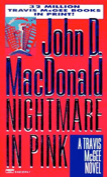
1964-- October-April 1964
This 2nd of the Travis McGee series is place in New York City where Travis goes to help out the sister of a friend. Her fiancee has been murdered, and the 10,000 he left behind raises questions as to its origin. The private mental hospital in which Travis finds himself under the influence of psychedelic drugs is the scene of some of MacDonald’s best prose regarding the drug culure.
A Purple Place for Dying* (Fawcett Gold Medal, May 1964)
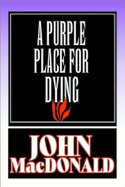
1964
Purple Place for Dying is the third book in John MacDonald's Travis McGee series, and McGee comes upon his most troubling experience yet. McGee is brought to the Midwest by Mona Yeoman, who suspects that her husband has pilfered her trust fund, and she wants a divorce.
McGee's job is to find out what happened to the money. Mona is murdered right in front of his eyes, but her body disappears when the police are called. Travis now has to find out everything about the murder and the mystery. As usual, McGee finds himself in danger the closer he comes to the truth.
The Quick Red Fox* (Fawcett Gold Medal, September 1964)
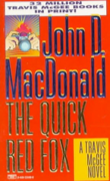
A Deadly Shade of Gold* (Fawcett Gold Medal, January 1965)
1965--February to March
Travis is involved in helping a famed Hollywood star who is being blackmailed. He looks at the photographs the blackmailer has sent him :
“Suddenly I knew what she reminded me of. A vixen. A quick red fox. I had seen one in heat long ago on an Adirondack morning in spring, pacing along well in front of the dog fox with a very alert and springy movement, tail curled high, turning to see if he still followed, tongue lolling from betweenher doggy grin." This is McGee's first impression of red-haired sex symbol Lysa Dean.
McGee follows a trail of broken relationships and torn-apart lives while working for Lysa Dean, and the journey is typical of MacDonald’s insight into modern life.
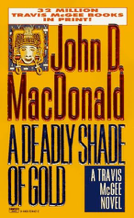
1965
A bloody chase novel taking McGee from Florida to Mexico to LA. MacDonald has a wondrous sense of place and you can feel the sensuous breezes and see the spectacular sunsets. In A Deadly Shade of Gold, McGee comes into possession of an evil-looking, solid gold Aztec icon that leads to a perilous fortune.
\ 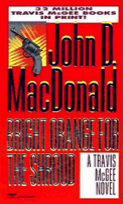
Bright Orange for the Shroud* (Fawcett Gold Medal, August 1965)
1965
Bright Orange for the Shroud tells of a dangerous confidence scheme that traps one of McGee's friends. Soon, McGee infiltrates the group and takes on its sexy operative, with explosive results.
Darker than Amber* (Fawcett Gold Medal, May 1966)
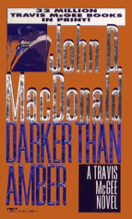
1966
McGee and his economist friend, Meyer, are are fishing while tied up to a bridge, minding their own business, when a woman is thrown off the bridge and sinks like a stone. in front of them. McGee dives overboard and is able to rescue the woman-despite the fact that herfeet are wired to a cement block. The woman, Vangie, turns out to be a high-priced prostitute who was involved in a scam gone bad.
McGee and Meyer are finally able to get the gist of Vangie's story, and decide to help.
This is the first novel where the character of Meyer, briefly on stage in earlier books, is finally fleshed-out as a character. JDM said once that Meyer was probably closer to himself--not the character of Travis.
One Fearful Yellow Eye* (Fawcett Gold Medal d1848, December 1966)
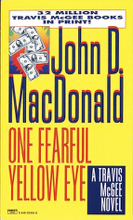
1966
In “One Fearful Yellow Eye” John D. MacDonald presents his hero, Travis McGee ,
in perhaps his most frightening, suspenseful episodes yet. McGee, that “knight in
tarnished armor,” loves helping his friends out of their troubles, especially bikini-clad
females in trouble. Longtime friend Glory Doyle has come to McGee for help
again. It seems that someone has “taken” over a half-million dollars from her
husband's account over the last year of his life.. McGee suspects blackmail, but can't
seem to figure out why.
Pale Gray for Guilt* (Fawcett Gold Medal, January 1968)
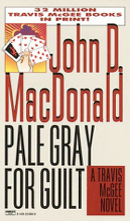
1967
Tush Bannon, is dead, murdered by some ruthless individuals who could care less that he had a wife and three children. It wasn’t \anythng he knew or anything he had done. He was just there.
..and they got him, crushed him to hamburger, and walked away counting their change.
But one thing they never could have figured.
Tush Bannlon was Travis McGee’s friend.
*
The Girl In The Plain Brown Wrapper* (Fawcett Gold Medal, December 1968)
Dress Her in Indigo* (Fawcett Gold Medal, August 1969)
The Long Lavender Look* (Fawcett Gold Medal, September 1970)
A Tan and Sandy Silence* (Fawcett Gold Medal, January 1972)
The Scarlet Ruse* (Fawcett Gold Medal, June 1973)
The Turquoise Lament* (Lippincott, November 1973)
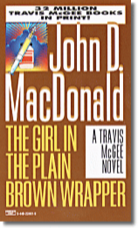
1968
McGee delves into the mystery of a rich and beautiful wanton who happens to be losing her mind, a little piece at a time. As he probes, he uncovers some of the strange corruptions that simmer behind the respectable facade of a quiet Florida town.
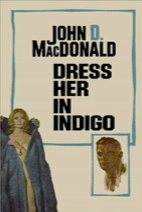
1969
The wench is dead--but Travis McGee was backtracking her wild, sad trail through the bizarre world of the hippies and drug freaks who had found haven in Mexico.
McGee would need all his cool, all his insight, to live up to the estimate of the rich and beautiful woman who perhaps held the key to the puzzle.
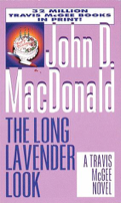
1970
A lovely young woman steps in front of Travis McGee’s headlights. McGee misses the girl but lands in ten feet of swamp water. As he’s limping along the deserted road, someone in an old truck takes a few shots at him. And, when he goes to the local sheriff to complain ,the intrepid Travis mcGee finds himself arrested and charged with murder.
Is this what they call Southern hospitality?
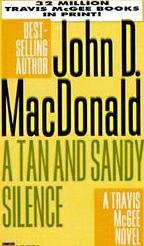
1971
Travis McGee is having the time of his life--he's doing nothing but enjoying
life on board the “Busted Flush,” entertaining all his friends in his best carefree manner!
That is, until long-ago acquaintance Harry Broil comes abroad, gun in hand, threatening
McGee within an inch of is life, accusing Travis of making off with his wife, Mary.
Mary was an old friend, one whom Travis prizes dearly. Now he has to find her. As
it wasn't likely for Mary to just run away, McGee knows that there is something seriously
wrong,.
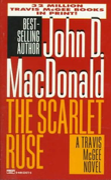
1972
McGee was busy with his beloved houseboat, The” Busted Flush. “ Too busy to pay attention to the little old man with the missing postage stamps. Except they were not ordinary stamps. No indeed.
They were rare stamps.
Four hundred thousand dollars worth.
Even so, McGee was not all that interested in them until a generously- endowed amazon named Mary Alice McDermit made her grand entrance....She knew a helluva lot about rare stanmps , and the ways to to a boat bum’s vulnerable heart.
But it wasn’t McGee’s heart that was in danger...A syndicate killer had put a contract out on McGee.
A killer who knew something about stamps, and veen more abou McGee.
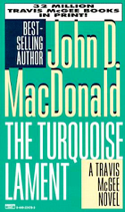
1973
Take that young woman, McGee, and file her under TTF...try to forget.
But McGee couldn’t forget. Pidge was special. First time McGee saw her she was in pig-tails andglassy-eyed in love for him. Now she was a grown woman and married to an ex-football jock name
Howie.
When he got the letter from Pidge McGee grabbed the first jet to Hawaii, and dried her tears. Howie was trying to kill her, she cried.
McGee began to check on them both. Suddenly Travis began to appreciate what dangerous game he stalked.
But McGee needed proof, a trap. And what better bait than himself?
The Dreadful Lemon Sky* (Lippincott, February 1975)
The Empty Copper Sea (Lippencott, September 1978
The Green Ripper* (Lippincott, September 1979)
Free Fall in Crimson* (Harper and Row, April 1981)
Cinnamon Skin* (Harper and Row, 1982)
The Lonely Silver Rain* (Knopf, 1985)
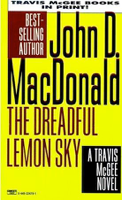
1974
Carrie Milligan, arrives in the middle of the night, while Travis is asleep on his houseboat, The Busted Flush. She is looking older and used and very scared. She has 100,000 with her.
She wants Travis to keep it safe. Until she returned. And no questions please--for old time’s sake.
So Travis keeps the money. But Carrie never came back. And never would. She was suddenly very dead.
The papers said it was an accident...And Travis doesn’t believe it. And he was going to find out who had “arranged” her death.
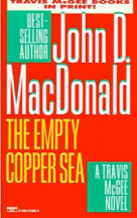
In “Empty Copper Sea,” Hub Lawless is reported drowned in a boating accident and his $2 million insurance policy raises some eyebrows, not to mention questions.
Travis's good friend Van Harder is held responsible for the death and much circumstantial --and suspicious--evidence points to his guilt. Thus, Travis becomes fully involved, more out of friendship than anything else. He cannot believe his friend is guilty.
I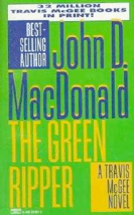
1979
This is a book of vengeance and revenge. Travis has finally found true love, and she is snatched from him by death. At first it appears to be a lethal illness, then horrifyingly, a random sophisticated killing. Travis is almost mad with a desire to find one man, one face to batter and then to execute. To face the fact that the murder appears to be an organizational hit with no single one-of-a-kind killer seems obscenely unfair. Travis follows some paper-thin leads, discards his identity, and infiltrates a terrorist camp sponsored by a cult.
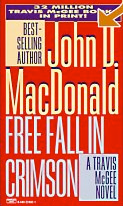
1981
McGee used to say that people who become legends in their own time usually have little time left.
Unless you’re McGee, who is indestructible.
This time, however, he came close to losing his status as a living legend when he agreed to track down the killers who brutally murdered an ailing millionaire.
The police reported death by person or person unknown.
McGee knew better.
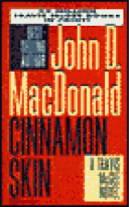
1982
When Travis McGee’s friend Meyer lent his boat to his niece, Norma, and her new husband Evan, he never dreamed he was signing their death warrant.
For suddenly, out in the waters of the Florida Keys, the boat was destroyed by an explosion.
To all appearances only Norma, Evan, and a crew member were aboard when it happened.
But McGee begins to suspect it’s not that simple.
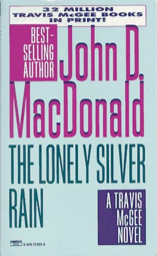
1984
Keeping himself alive is something McGee has always taken for granted--until his search for a wealthy friend’s missing yacht places him square in the center of the international cocaine trade.
As he follows a scorching white line from Miami’s penthouse suites to a tiny village in Mexico’s Yucatan Peninsula Travis finds himsself the target of some of the most ruthless villains he’s ever met.
Pressed into contemplating for the first time his own mortality and jolted into taking stock of his life he discovers amid all the danger the astonishing surprise behind the cat-shaped pipe cleaners someone is leaving at this door.
BIBLIOGRAPHY
* indicates a Travis McGee story.
* The Brass Cupcake (Fawcett Gold Medal, October 1950) (color, but not a McGee)
* Murder for the Bride (Fawcett Gold Medal, June 1951)
* Judge Me Not (Fawcett Gold Medal, October 1951)
* Weep for Me (Fawcett Gold Medal, 1951)
* Wine of the Dreamers (Greenberg, 1951)
* The Damned (Fawcett Gold Medal, June 1952)
* Ballroom of the Skies (Greenberg, 1952)
* Dead Low Tide (Fawcett Gold Medal, May 1953)
* The Neon Jungle (Fawcett Gold Medal, August 1953)
* Cancel All Our Vows (Appleton-Century Crofts, 1953)
* Planet Of The Dreamers (Pocket Books, 1953)
* All These Condemned (Fawcett Gold Medal, August 1954)
* Area of Suspicion (Dell First Edition 12, 1954)
* Contrary Pleasure (Appleton-Century Crofts, 1954)
* A Bullet for Cinderella (Dell First Edition 62, 1955) (reprinted as On the Make)
* Cry Hard, Cry Fast (Popular Library 675, 1955)
* April Evil (Dell First Edition 85, 1956)
* Border Town Girl (Popular Library 750, 1956) (reprinted as Five Star Fugitive)
* Murder in the Wind (Dell First Edition A113, 1956) (reprinted as Hurricane)
* You Live Once (Popular Library 737, 1956) (reprinted as You Kill Me)
* Death Trap (Dell First Edition A130, February 1957)
* The Price of Murder (Dell First Edition A152, October 1957)
* The Empty Trap (Popular Library 830, December 1957
* A Man of Affairs (Dell First Edition B112, December 1957)
* The Deceivers (Dell First Edition B117, May 1958)
* Clemmie (Fawcett Gold Medal, June 1958)
* The Executioners (Simon and Schuster, 1958) (reprinted as Cape Fear)
* Soft Touch (Dell First Edition B121, August 1958)
* Deadly Welcome (Dell First Edition B127, March 1959)
* The Beach Girls (Fawcett Gold Medal, August 1959)
* Please Write for Details (Simon and Schuster, December 1959)
* The Crossroads (Simon and Schuster, 1959)
* The Lethal Sex (Dell First Edition B141, 1959) (editor) (stories by women mystery
writers)
* Slam the Big Door (Fawcett Gold Medal, January 1960)
* The Only Girl in the Game (Fawcett Gold Medal, July 1960)
* The End of the Night (Simon and Schuster, 1960)
* Where is Janice Gantry? (Fawcett Gold Medal, January 1961)
* One Monday We Killed Them All (Fawcett Gold Medal s1177, December 1961)
* A Key to the Suite (Fawcett Gold Medal s1198, March 1962)
* The Girl, the Gold Watch and Everything (Fawcett Gold Medal s1259, December
1962) (colour, but no McGee)
* A Flash Of Green (Simon and Schuster, 1962) (colour, but no McGee)
* I Could Go on Singing (Fawcett Gold Medal, March 1963) (screenplay novelization)
* On the Run (Fawcett Gold Medal k1292, April 1963)
* The Drowner (Fawcett Gold Medal k1302, May 1963)
* The Deep Blue Goodbye* (Fawcett Gold Medal k1405, April 1964)
* Nightmare in Pink* (Fawcett Gold Medal, April 1964)
* A Purple Place for Dying* (Fawcett Gold Medal, May 1964)
* The Quick Red Fox* (Fawcett Gold Medal, September 1964)
A Deadly Shade of Gold* (Fawcett Gold Medal, January 1965)
* Bright Orange for the Shroud* (Fawcett Gold Medal, August 1965)
* * The House Guests (Doubleday, 1965) (nonfiction)
* Darker than Amber* (Fawcett Gold Medal, May 1966)
* The Last One Left (Doubleday, December 1966)
* One Fearful Yellow Eye* (Fawcett Gold Medal d1848, December 1966)
* End of the Tiger and Other Stories (Fawcett Gold Medal, 1966)
o "Hangover"
o "The Big Blue"
o "End of the Tiger"
o "The Trouble with Erica"
o "Long Shot"
o "Looie Follows Me"
o "Blurred View"
o "The Loveliest Girl in the World"
o "Triangle"
o "The Bear Trap"
o "Romantic Courtesy"
o "The Fast Loose Money"
o "The Straw Witch"
o "The Trap of Solid Gold"
o "Afternoon of the Hero"
* Pale Gray for Guilt* (Fawcett Gold Medal, January 1968)
* The Girl In The Plain Brown Wrapper* (Fawcett Gold Medal, December 1968)
* No Deadly Drug (Doubleday, 1968) (nonfiction)
* Dress Her in Indigo* (Fawcett Gold Medal, August 1969)
* The Long Lavender Look* (Fawcett Gold Medal, September 1970)
* S*E*V*E*N (Fawcett Gold Medal, 1971)
o "The Random Noise of Love"
o "Dear Old Friend"
o "The Willow Pool"
o "Quarrel"
o "Woodchuck"
o "Double Hannenframmis"
o "The Annex"
* A Tan and Sandy Silence* (Fawcett Gold Medal, January 1972)
* The Scarlet Ruse* (Fawcett Gold Medal, June 1973)
* The Turquoise Lament* (Lippincott, November 1973)
* The Dreadful Lemon Sky* (Lippincott, February 1975)
* Condominium (Lippincott, March 1977)
* The Empty Copper Sea* (Lippincott, September 1978)
* Other Times, Other Worlds (Fawcett, 1978) (edited by MacDonald and Martin H. Greenberg; MacDonald wrote an afterword)
o "The Mechanical Answer"
o "Dance of a New World"
o "Ring Around the Redhead"
o "A Child is Crying"
o "Flaw"
o "But Not to Dream"
o "The Miniature"
o "Spectator Sport"
o "Half-Past Eternity"
o "The Big Contest"
o "Susceptibility"
o "Common Denominator"
o "Game for Blondes"
o "Labor Supply"
o "The Legend of Joe Lee"
o "The Annex"
* The Green Ripper* (Lippincott, September 1979)
* Free Fall in Crimson* (Harper and Row, April 1981)
* Nothing Can Go Wrong (Harper and Row, 1981) (with Captain John H. Kilpack)
* Cinnamon Skin* (Harper and Row, 1982)
* The Good Old Stuff (Harper and Row, 1982) (edited by Martin H. Greenberg, Francis M. Nevins, Jr., and Walter and Jean Shine)
o "Murder for Money"
o "Death Writes the Answer"
o "Miranda"
o "They Let Me Live"
o "Breathe No More"
o "From Some Hidden Grave"
o "A Time for Dying"
o "Noose for a Tigress"
o "Murder in Mind"
o "Check Out at Dawn"
o "She Cannot Die"
o "Dead on the Pin"
o "A Trap for the Careless"
* Two (Carroll and Graf, 1983) (collection)
* More Good Old Stuff (Knopf, 1984) (collection)
o "Deadly Damsel"
o "State Police Report That ..."
o "Death for Sale"
o "A Corpse in His Dreams"
o "I Accuse Myself"
o "A Place to Live"
o "Neighborly Interest"
o "The Night is Over"
o "Secret Stain"
o "Even Up the Odds"
o "Verdict"
o "The High Gray Walls of Hate"
o "Unmarried Widow"
o "You Remember Jessie"
* One More Sunday (Knopf, 1984)
* The Lonely Silver Rain* (Knopf, 1985)
* Barrier Island (Hodder and Stoughton, 1986)
* A Friendship: The Letters of Dan Roawan and John D. MacDonald 1967-74 (Knopf, 1986)
* Reading for Survival (Library of Congress, 1987)
Short Fiction
1946
* "Conversation on Deck" (The American Courier, January 1946)
* "The Game" (The American Courier, February 1946)
* "Cash on the Coffin" (Detective Tales, May 1946)
* "A Handful of Death" (Doc Savage, June 1946) (as Peter Reed)
* "Blame Those Who Die" (Short Stories, 25 June 1946)
* "Bury the Pieces!" (Dime Mystery, July 1946)
* "The Flying Elephants" (Short Stories, 10 July 1946)
* "Interlude in India" (Story, July-August 1946)
* "The Dry Mouth of Danger" (Doc Savage, August 1946)
* "The Dead Dream" (The Shadow, September 1946)
* "Justice in the Sun" (Doc Savage, October 1946)
* "Female of the Species" (Dime Detective, October 1946)
* "Get Dressed for Death" (Mammoth Mystery, October 1946)
* "The Little People" (Doc Savage, November 1946)
* "The Scarred Hand" (Doc Savage, November 1946) (as John Farrell)
* "The Startled Face of Death" (Doc Savage, November 1946) (as Scott O'Hara)
* "The Whispering Knives" (The Shadow, November 1946)
* "Coward in the Game" (Short Stories, 25 November 1946)
* "Private War" (Doc Savage, December 1946)
* "You Got to Have a Good Lip" (Esquire, December 1946)
* "Redheads Won't Wait" (The Shadow, December 1946) (as Peter Reed)
* "I Ain't So Dumb" (The Shadow, December 1946) (as Robert Henry)
* "A Bat in the Hall" (The Shadow, December 1946)
1947
* "Muddy Gun" (Best Stories, January 1947)
* "The Hands of an Artist" (The Shadow, January 1947)
* "The Fixed Smile of Death" (The Shadow, January 1947) (as Robert Henry).
* "The Bright Flash of Vengeance" (The Shadow, January 1947) (as Peter Reed)
* "Eight Dozen Agents." (Doc Savage, January 1947)
* "Hole in None" (Liberty, 4 January 1947)
* "Dead to the World" (aka "No Business for an Amateur") (Dime Detective, February 1947)
* "Bonded in Death" (Doc Savage, February 1947) (as Harry Rieser)
* "The Deadly Game of Darts" (Doc Savage, February 1947)
* "The Anonymous Letter" (The Shadow, February-March 1947)
* "Backlash" (The Shadow, February-March 1947) (as Peter Reed)
* "Nor Iron Bars" (Doc Savage, March-April 1947)
* "You've Got to Be Cold" (The Shadow, April-May 1947)
* "The Notched Ears" (Best Stories, May 1947)
* "The Pay-Off" (Cosmopolitan, May 1947)
* "Suicidal Journey" (Dime Detective, June 1947)
* "Crooked Circle" (Fight Stories (?), after June 1947)
* "The Pendans Box" (Bluebook, July 1947)
* "They Let Me Live" (Doc Savage, July-August 1947)
* "To Cut the Cards" (Doc Savage, July-August 1947) (as Peter Reed)
* "North on the Parkway" (Esquire, August 1947)
* "Never Marry Murder" (The Shadow, August-September 1947) (as Peter Reed)
* "Manhattan Horse Opera" (aka "Heads I Win, Tails You Lose") (Black Mask, September 1947)
* "Design for Dying" (Dime Detective, September 1947)
* "The Chinese Pit" (Doc Savage, September-October 1947)
* "The Gentle Killer" (?, after September 1947)
* "Oh, Give Me a Hearse!" (Dime Detective, October 1947)
* "Begin Again" (Liberty, November 1947)
* "My Mission Is Murder" (Dime Detective, November 1947)
* "Or the World Will Die" (Doc Savage, November-December 1947)
* "Second Visitor" (Doc Savage, November-December 1947) (as Peter Reed)
* "Worse Than Murder" (Doc Savage, November-December 1947) (as Henry Rieser)
* "That Old Grey Train" (Super Sports, November? 1947)
* "What About Alice?" (The Sign, December 1947)
* "Big John Fights Again" (Super Sports, December 1947)
* "Punch Your Way Home" (Sports Fiction, December 1947?)
1948
* "Even Up the Odds" (Detective Story Magazine, January 1948)
* "Come Die with Me!" (New Detective, January 1948)
* "Cosmetics" (Astounding Science Fiction, February 1948)
* "The Pastel Production Line" (Bluebook, February 1948)
* "Pickup" (Cosmopolitan, February 1948)
* "High Walls of Hate" (Dime Detective, February 1948)
* "With Soul So Dead" (Dime Detective, March 1948)
* "One Vote for Murder" (New Detective, March 1948)
* "Her Black Wings" (Shock, March 1948)
* "High Dive to Oblivion" (Dime Detective, April 1948)
* "The Corpse Rides at Dawn" (Ten-Story Western, April 1948)
* "The Spiralled Myth" (Spectator Club, April 1948)
* "The Mechanical Answer" (Astounding Science Fiction, May 1948)
* "Death Sleeps Here!" (New Detective, May 1948)
* "Blood of the Vixen" (Shock, May 1948)
* "Satan's Angel" (Shock, May 1948) (as Scott O'Hara)
* "The Cold Trail of Death" (Doc Savage, May-June 1948)
* "The Tin Suitcase" (Doc Savage, May-June 1948) (as Peter Reed)
* "Homicidal Hiccup" (Detective Tales, June 1948)
* "Call Your Murder Signals!" (Dime Detective, June 1948)
* "Venomous Lady" (Shock, July 1948)
* "Sepulchre of the Living"(Shock, July 1948) (as Scott O'Hara)
* "So Sorry" (Sports Fiction, July 1948)
* "Cavaliers Make Good Corpses." (Dime Detective, August 1948)
* "Loser Take All" (Sports Novels, August 1948)
* "Fatal Accident" (The Shadow, Fall 1948)
* "The Case of the Carved Model" (Black Mask, September 1948)
* "Nicky and the Tin Finger" (Bluebook, September 1948)
* "Red-Headed Bait" (Detective Tales, September 1948)
* "Scene of the Crime" (Detective Tales, September 1948) (as Scott O'Hara)
* "Just a Kill in the Dark" (New Detective, September 1948)
* "Trial by Fury" (New Detective, September 1948) (as Scott O'Hara)
* "Tune in on Station Homicide" (New Detective, September 1948) (as Peter Reed)
* "Dance of a New World" (Astounding Science Fiction, September 1948)
* "Runaway Cleats" (Sports Novels, September 1948)
* "Thunder King" (Sports Novels, September 1948) (as Scott O'Hara)
* "Shenadun" (Startling Stories, September 1948)
* "Deep Death" (Doc Savage, September-October 1948)
* "My Husband Dies Slowly" (Dime Detective, October 1948)
* "They Never Quit" (Sports Fiction, October 1948)
* "Death Is the Answer" (Thrilling Detective, October 1948)
* "That Mess Last Year" (Thrilling Wonder Stories, October 1948)
* "School for the Stars" (Astounding Science Fiction, October 1948)
* "Blonde Bait for the Murder Master" (Crack Detective Stories, November 1948)
* "Glory Blaster" (Sports Novels, November 1948)
* "Ring Around the Redhead" (Startling Stories, November 1948)
* "No Grave Has My Love" (Dime Detective, December 1948)
* "Buzz-Saw Belter" (New Sports, December 1948)
* "A Child Is Crying" (Thrilling Wonder Stories, December 1948)
* "Successful Season" (?, 1948?)
* "When You Got a Pigeon" (The Shadow, December-January 1948-1949)
1949
* "Murder in Mind" (Mystery Book, Winter 1949)
* "Hot-Seat on the Aisle" (Detective Tales), January 1949)
* "Damsels of the Deep" (Dime Detective, January 1949)
* "Take the Bum Out!" (Fifteen Sports Stories, January 1949)
* "Three's a Shroud" (New Detective, January 1949)
* "Flaw" (Startling Stories, January 1949)
* "The Great Stone Death" (Weird Tales, January 1949)
* "Blackmail Breeds Bullets" (All-Story Detective, February 1949)
* "Killer's Nest" (Detective Tales, February 1949)
* "A Coffin a Day" (FBI Detective, February 1949)
* "Fight, Scrub, Fight!" (New Sports, February 1949)
* "Killing All Men!" (Black Mask, March 1949)
* "Kiss the Corpse Goodbye" (Black Mask, March 1949) (as Scott O'Hara)
* "I'll Drown You in My Dreams" (Dime Detective, March 1949)
* "Danger -- Death Ahead!" (New Detective, March 1949)
* "Last Chance Cleats" (Sports Novels, March 1949)
* "A Corpse in His Dreams") (Mystery Book, Spring 1949)
* "The Widow Wouldn't Weep" (All-Story Detective, April 1949)
* "His Own Funeral" (Detective Tales, April 1949) (as John Lane)
* "The Corpse Belongs to Daddy" (Dime Detective, April 1949)
* "Loot for the Unlucky Lady" (FBI Detective, April 1949)
* "Death Quotient" (Super Science Stories, April 1949)
* "All Our Yesterdays" (Super Science Stories, April 1949) (as John Wade Farrell)
* "Delusion Drive" (Super Science Stories, April 1949) (as Peter Reed)
* "Murder in One Syllable" (Black Mask, May 1949)
* "You'll Never Escape" (Dime Detective, May 1949)
* "Get Out of Town" (New Detective, May 1949)
* "Immortality" (Startling Stories, May 1949)
* "Somebody Has to Do the Job" (Toronto Star Weekly, 14 May 1949)
* "But Not to Dream" (Weird Tales, May 1949)
* "You Remember Jeanie" (Crack Detective Stories, May 1949)
* "Three Strikes -- You're Dead!" (All-Story Detective, June 1949)
* "Too Many Sinners" (Dime Detective, June 1949)
* "Make Mine Murder!" (FBI Detective, June 1949)
* "Like a Keepsake" (Thrilling Wonder Stories, June 1949)
* "Death Is a Lap Ahead" (Adventure, July 1949)
* "Tank-Town Matador" (Argosy, July 1949)
* "Heritage of Hate" (aka "Triple Cross") (Black Mask, July 1949)
* "Swing-Time Sucker" (Detective Tales, July 1949)
* "A Corpse-Maker Goes Courting" (Dime Detective, July 1949)
* "The Glory Punch" (Fifteen Sports Stories, July 1949)
* "Bye, Bye, Backfield" (Fifteen Sports Stories, July 1949) (as John Wade Farrell)
* "The Thunder Road" (Fifteen Sports Stories, July 1949) (as Peter Reed)
* "Blue Water Fury" (Fifteen Sports Stories, July 1949) (as Scott O'Hara)
* "The Cold, Cold Ground" (New Detective, July 1949)
* "The Hunted" (Super Science Stories, July 1949)
* "Bedside Murder" (Mystery Book, Summer 1949)
* "Trojan Horse Laugh" (Astounding Science Fiction, August 1949)
* "Looie Follows Me" (Collier's, 27 August 1949)
* "What Makes Sammy Laugh?" (Detective Tales, August 1949)
* "Amphiskios" (Thrilling Wonder Stories, August 1949)
* "Poor Little Rich Corpse" (Detective Tales, September 1949)
* "Murder Run-Around" (Dime Detective, September 1949)
* "Mad About Murder" (Dime Detective, September 1949) (as Scott O'Hara)
* "Six Points to Remember" (Fifteen Sports Stories, September 1949)
* "Dead -- As in Darling" (New Detective, September 1949)
* "A Condition of Beauty" (?, September 1949)
* "Minion of Chaos" (Super Science Stories, September 1949)
* "The Miniature" (Super Science Stories, September 1949) (as Peter Reed)
* "Blue Stars for a Dead Lady" (Detective Tales, October 1949)
* "Target for Tonight" (Dime Detective, October 1949)
* "Last Rendezvous" (Dime Mystery, October 1949)
* "Warrant for an Old Flame" (FBI Detective, October 1949)
* "A Young Man of Promise" (Argosy, November 1949)
* "The Durable Corpse" (Dime Detective, November 1949)
* "Run the Man Down" (Fifteen Sports Stories, November 1949)
* "Hang the Man High!" (Fifteen Western Tales, November 1949)
* "Half Past Mayhem" (New Detective, November 1949)
* "Appointment for Tomorrow" (Super Science Stories, November 1949)
* "The Sleepers" (Super Science Stories, November 1949) (as John Wade Farrell)
* "Love, Inc." (Today's Woman, November 1949)
* "Case of the Burning Blonde" (Detective Tales, December 1949)
* "Take a Powder, Galahad!" (Dime Detective, December 1949)
* "Nine Coffins for Rocking H" (Dime Western, December 1949)
1950
* "Moonlit Sport" (The American Magazine, January 1950)
* "Swing and Slay" (Dime Detective, January 1950)
* "Stand Up and Slug!" (Fifteen Sports Stories, January 1950)
* "Stop, Look -- and Die!" (New Detective, January 1950)
* "The First One" (Startling Stories, January 1950)
* "Spin, Devil!" (Super Science Stories, January 1950) (as John Wade Farrell)
* "Spectator Sport" (Thrilling Wonder Stories, February 1950)
* "The Filly from Philly" (Toronto Star Weekly, 25 February 1950)
* "Man-Stalk" (Argosy, March 1950)
* "The Judas Chick" (Detective Tales, March 1950)
* "A Corpse on Me!" (Dime Detective, March 1950)
* "Fall Guy" (New Detective, March 1950)
* "The Ultimate One" (Super Science Stories, March 1950)
* "The Sitting Duck" (Detective Tales, April 1950)
* "Blood on the Midway" (Dime Detective, April 1950) (as Scott O'Hara)
* "Pigskin Patsy" (Fifteen-Story Detective, April 1950)
* "The Plunder Five" (New Sports, April 1950)
* "Journey for Seven" (Thrilling Wonder Stories, April 1950)
* "Portrait of a Murderess" (Detective Book Magazine, Spring 1950)
* "Breathe No More, My Lovely!" (Detective Tales, May 1950)
* "The Long, Red Night" (Detective Tales, May 1950) (as John Lane)
* "Night Watch" (Detective Tales, May 1950) (as Scott O'Hara)
* "Yes, Sir, That's My Slay-Babe!" (Dime Detective, May 1950)
* "Vanguard of the Lost" (Fantastic Adventures, May 1950)
* "Money Green" (Fifteen Sports Stories, May 1950)
* "This One Will Kill You" (New Detective, May 1950)
* "Wine of the Dreamers" (Startling Stories, May 1950)
* "By the Stars Forgot" (Super Science Stories, May 1950)
* "Gift of Darkness" (Super Science Stories, May 1950) (as Peter Reed)
* "College-Cut Kill" (Dime Detective, June 1950)
* "Sir Lancelot's Crime Wave" (Dime Detective, June 1950) (as Scott O'Hara)
* "Dead on the Pin" (Mystery Book, Summer 1950)
* "Jukebox Jungle" (Black Mask, July 1950)
* "Run, Sister, Run!" (Detective Tales, July 1950)
* "Dead Men Don't Scare" (Dime Detective, July 1950)
* "Five-Star Fugitive" (Dime Detective, July 1950) (as Scott O'Hara)
* "Half-Past Eternity" (Super Science Stories, July 1950)
* "Escape to Fear" (Super Science Stories, July 1950) (as Peter Reed)
* "Make One False Move" (Argosy, August 1950)
* "His Fatal Fling" (Dime Detective, August 1950)
* "The Lady Is a Corpse!" (Detective Tales, September 1950)
* "Exit Smiling" (Dime Detective, September 1950)
* "The Homesick Buick" (Ellery Queen's Mystery Magazine, September 1950)
* "Too Early to Tell" (Adventure, October 1950)
* "Miranda" (Fifteen Mystery Stories, October 1950)
* "Shadow on the Sand" (Thrilling Wonder Stories, October 1950)
* "The Paw of the Cat" (Detective Tales, November 1950)
* "Tri-Kill Cutie" (Dime Detective, November 1950)
* "For Murder -- or Worse" (New Detective, November 1950)
* "Final Mission" (Planet Stories, November 1950)
* "The Big Contest" (Worlds Beyond, December 1950)
* "I Love You (Occasionally)" (This Week, 31 December 1950)
1951
* "Death for the Asking (Detective Fiction, January 1951)
* "Susceptibility" (Galaxy Science Fiction, January 1951)
* "Hand from the Void" (Super Science Stories, January 1951)
* "Destiny Deferred" (Super Science Stories, January 1951(as John Wade Farrell)
* "Over My Dead Body!" (Detective Tales, February 1951)
* "The Curse of the `Star'" (Short Stories, February 1951)
* "Get Thee Behind Me" (Detective Fiction, March 1951)
* "Case of Nerves" (Detective Tales, March 1951)
* "The Deadliest Game" (Detective Tales, April 1951)
* "Death Is My Comrade" (New Detective, April 1951)
* "Salute to Courage" (Fifteen Sports Stories, April 1951)
* "Violence Inherited" (Detective Fiction, May 1951)
* "Nothing Must Change" (Redbook, June 1951)
* "Escape to Chaos" (Super Science Stories, June 1951)
* "Cosmic Knot" (Super Science Stories, June 1951) (as Peter Reed)
* "Path of Glory" (Adventure, July 1951)
* "Lay Me Down and Die" (Detective Fiction, July 1951)
* "Common Denominator" (Galaxy Science Fiction, July 1951)
* "Crime of Omission" (Detective Tales, August 1951)
* "Death Runs in the Family" (Dime Detective, August 1951)
* "Dateline -- Death" (New Detective, August 1951)
* "Who Stopped That Clock?" (This Week, 12 August 1951)
* "The White Fruit of Banaldar" (Startling Stories, September 1951)
* "Big League Busher" (Sport Magazine (?), after September 1951)
* "Case of the Gorgeous Gams" (Detective Tales, October 1951)
* "The Cloob from Glasgow" (Fifteen Sports Stories, October 1951)
* "The Cardboard Star" (The American Legion Magazine, December 1951)
* "The Girl Who Wanted Money" (Dime Detective, December 1951)
* "The Man Who Died" (Toronto Star Weekly, 15 December 1951)
1952
* "Very Junior Miss" (McCall's, January 1952)
* "Mr. Killer" (Today's Woman, January 1952)
* "Hell's Belter" (Fifteen Sports Stories, February 1952)
* "There Comes a Time" (Redbook, February 1952)
* "The Feather Wrench" (Toronto Star Weekly, 2 February 1952)
* "Betrayed" (The American Magazine, March 1952)
* "All That Blood Money Can Buy" (Detective Tales, April 1952)
* "The Man from Limbo" (Dime Detective, March 1952; Detective Story Magazine, April 1952)
* "My Brother's Widow" (Collier's, 15 March 1952 to 12 April 1952)
* "Refund for Murder" (Cosmopolitan, May 1952)
* "Delivery Boy War" (Bluebook, August 1952)
* "Who's the Blonde?" (Collier's, 9 August 1952)
* "Noose for a Tigress" (Dime Detective, August 1952)
* "Hit and Run" (Good Housekeeping, August 1952)
* "The Clay Pigeon Shoots Back!" (New Detective, August 1952)
* "Elimination Race" (Collier's, 13 September 1952)
* "Game for Blondes" (Galaxy Science Fiction, October 1952)
* "The Doll" (Cosmopolitan, November 1952)
* "Double Harness" (Detective Story Magazine, November 1952)
* "Identification" ("Author's Guild Bulletin," after November 1952)
* "Incubation" (In Future Tense, New York: Greenberg Publishers, December 1952)
* "He Knew a Broadway Star" (This Week, 14 December 1952)
* "Dead on Christmas Street" (Collier's, 20 December 1952)
* "A Good Judge of Men" (Argosy, ? 1952)
1953
* "A Day in the Sun" (Bluebook, February 1953)
* "Forever Yours" (McCall's, February 1953)
* "Death's Eye View" (New Detective, February 1953)
* "The Fourteenth of February" (?, February 1953)
* "What Are the Symptoms, Dear?" (This Week, 22 February 1953)
* "The Second Chance" (Bluebook, March 1953)
* "Dead Reckoning" (Detective Story Magazine, March 1953)
* "Suspicion Island" (Cosmopolitan, May 1953)
* "Labor Supply" (Fantasy and Science Fiction, May 1953)
* "A Matter of Life and Death" (This Week, 14 June 1953)
* "Finders Killers" (Detective Story Magazine, July 1953)
* "He's Not Talking to Me" (?, July 1953)
* "The Trouble with Erica" (Cosmopolitan, September 1953)
* "The Innocent Victims" (Bluebook, November 1953)
* "Night Fright" (Cosmopolitan, November 1953)
1954
* "Six Golden Pennies" (Cosmopolitan, February 1954)
* "Flight of the Tiger" (Collier's, 5 March 1954 - 2 April 1954)
* "She Tried to Make Her Man Behave" (This Week, 7 March 1954)
* "The Big Gun" (Bluebook, May 1954)
* "The Man Who Almost Blew His Top" (This Week, 30 May 1954)
* "Built for Speed" (Argosy, June 1954)
* "First Offense" (Cosmopolitan, August 1954)
* "The Man Without a Home" (This Week, 22 August 1954)
* "I Always Get the Cuties" (Ellery Queen's Mystery Magazine, November 1954)
1955
* "The Killer" (Manhunt, January 1955)
* "There Hangs Death" (This Week, 20 February 1955)
* "Tournament" (Bluebook, April 1955)
* "Deadly Victim" (Cosmopolitan, April 1955)
* "The Bear Trap" (Cosmopolitan, May 1955)
* "Virus H" (Bluebook, June 1955)
* "The Impulse" (Cosmopolitan, June 1955)
* "In a Small Motel" (Justice, July 1955)
* "Too Young to Marry" (This Week, 25 September 1955)
* "Long Shot" (Argosy, October 1955)
* "Scared Money" (Justice, October 1955)
* "Man on a High Ledge" (Bluebook, November 1955)
1956
* "Jail Bait" (Argosy, January 1956)
* "April Evil" (Cosmopolitan, January 1956)
* "The Unsuitable Girl" (Collier's, February 1956)
* "The Magic Valentines" (This Week, 5 February 1956)
* "Enough to Cure the Blues" (Bluebook, March 1956)
* "Don't Get Carried Away" (Toronto Star Weekly, 24 March 1956)
* "The Fraud That Paid Off" (This Week, 22 April 1956)
* "Squealer" (Manhunt, May 1956)
* "The Men Women Marry (Collier's, June 1956)
* "Linda" (In Border Town Girl, Popular Library, June 1956)
* "Hangover" (Cosmopolitan, July 1956)
* "Hurricane" (Redbook, August 1956)
* "A Criminal Mind" (Cosmopolitan, November 1956)
* "Open Before Christmas" (Woman's Home Companion, December 1956)
* "Death of a Dealer" (This Week, ? 1956)
1957
* "The End of Her Life" (Cosmopolitan, January 1957)
* "The Rabbit Gets a Gun" (Manhunt, January 1957)
* "The Bullets Lied" (This Week, 6 January 1957)
* "The Heat of Money" (Cosmopolitan, April 1957)
* "The Giant Who Came to Our House" (This Week, 5 May 1957)
* "A Romantic Courtesy" (Cosmopolitan, July 1957)
* "The Executioners" (Ladies Home Journal, October 1957 - November 1957)
1958
* "College Man" (Cosmopolitan, February 1958)
* "Black Cat in the Snow" (Manhunt, February 1958)
* "Taint of the Tiger" (Cosmopolitan, March 1958)
* "The Faithless" (Redbook, May 1958)
* "The Knife, the Chain, and the Schoolyard" (Ladies Home Journal, May 1958)
* "Man in a Trap" (This Week, 15 June 1958)
* "The Fast Loose Money" (Cosmopolitan, July 1958)
1959
* "Ultimate Surprise" (Cosmopolitan, January 1959)
* "Crossroads" (Cosmopolitan, June 1959)
* "Honeymoon in the Off Season" (Redbook, September 1959)
1960+
* "That Strangest Month of All" (Family Circle, October 1959)
* "The Tug of Evil" (Cosmopolitan, January 1960)
* "The Trap of Solid Gold" (Ladies Home Journal, April 1960)
* "End of the Night" (Cosmopolitan, May 1960)
* "Where Is Janice Gantry?" (Cosmopolitan, December 1960)
* "The Underwater Safari" (Bluebook, ? 1960)
* "Travel Light and Travel Far" (Cosmopolitan, January 1961)
* "Kitten on a Trampoline" (The Saturday Evening Post, 8 April 1961)
* "A Young Man's Game" (Argosy, May 1961)
* "Saturday's Child" (McCall's, May 1961)
* "Double, Double" (Golf, June 1961)
* "The Tempestuous Career of Molly Murdock" (McCall's, July 1961)
* "Sing a Song of Terror" (The Saturday Evening Post, 9 September 1961)
* "Hit and Run" (The Saturday Evening Post, 16 September 1961)
* "One Monday We Killed Them All" (Cosmopolitan, November 1961)
* "An Island of Her Own" (Redbook, February 1962)
* "Where the Body Lies" (Cosmopolitan, August 1962)
* "The Widow's Estate" (Good Housekeeping, October 1962)
* "The Drowner" (Cosmopolitan, January 1963)
* "The Obvious Woman" (The Saturday Evening Post, 30 March 1963)
* "Funny the Way Things Work Out" (Ellery Queen's Mystery Magazine, April 1963)
* "End of the Tiger" (This Week, 20 October 1963)
* "The Straw Witch" (This Week, 12 January 1964)
* "Blurred View" (This Week, 23 February 1964)
* "The Loveliest Girl in the World" (This Week, 15 March 1964)
* "Wild, Wonderful Old Man" (This Week, 29 March 1964)
* "The Night Jamie Grew Up" (This Week, 24 May 1964)
* "A Touch of Miss Mint" (This Week, 19 July 1964)
* "A Matter of Trust" (Redbook, August 1964)
* "The White Lie" (This Week, 2 August 1964)
* "Eyewitness" (Argosy, September 1964)
* "Cop Probe" (Argosy, October 1964)
* "The Legend of Joe Lee" (Cosmopolitan, October 1964)
* "Bright Orange Shroud"* (Cosmopolitan, April 1965)
* "Taste for Mischief" (This Week, 20 June 1965)
* "Child Wife" (This Week, 29 August 1965)
* "The Girl in the Yellow Suit" (This Week, 19 December 1965)
* "Darker Than Amber"* (Cosmopolitan, April 1966)
* "Funny Man" (The Saturday Evening Post, 21 May 1966)
* "The Quickest Way Home" (This Week, 19 June 1966)
* "Triangle" (Cavalier, September 1966)
* "One Fearful Yellow Eye"* (Cosmopolitan, November 1966)
* "Quarrel" (Playboy, May 1967)
* "The Last One Left" (Argosy, July 1967)
* "The Annex" (Playboy, May 1968)
* "The Reference Room" (In With Malice Toward All, G. P. Putnam's Sons, 1968)
* "Dear Old Friend" (Playboy, April 1970)
* "Double Hannenframmis" (Playboy, August 1970)
* "Parody of Spillane" (The JDM Bibliophile, August 1970)
* "He Was Always a Nice Boy" (Ellery Queen's Mystery Magazine, March 1971)
* "The Random Noise of Love" (In S*E*V*E*N, Fawcett Gold Medal, April 1971)
* "The Willow Pool" (In S*E*V*E*N, Fawcett Gold Medal, April 1971)
* "Woodchuck" (In S*E*V*E*N, Fawcett Gold Medal, April 1971)
* "The Turquoise Lament"* (Cosmopolitan, March 1974)
* "The Taste of Gravy" (Playboy, June 1974)
* "The Dreadful Lemon Sky"* (Cosmopolitan, September 1975)
* "Finding Anne Farley" (aka "Ring My Love with Diamonds") (Various Field Syndicate newspapers beginning 22 May 1977)
* "Wedding Present" (Antaeus, Spring/Summer 1977)
* "A Terminal Case"* (New York, 3 October 1977)
* "Condominium" (Book Digest, November 1977)
* "Friend of the Family" (Various Field Syndicate newspapers beginning 24 September 1978.
* "The Accomplice" (In Who Done It?, Boston: Houghton-Mifflin, Spring 1980)
* "J. R. Eats Humble Pie" (Panorama, September 1980)
One More Sunday (Knopf, 1984)
• The Lonely Silver Rain* (Knopf, 1985)
• Barrier Island (Hodder and Stoughton, 1986)
• A Friendship: The Letters of Dan Rowan and John D. MacDonald 1967-74 (Knopf, 1986)
• * "The Lad Is Not for Burning" (In Bred Any Good Rooks Lately?, Doubleday 1986.
Reading for Survival (Library of Congress, 1987)
PRIMARY SOURCE:
A BIO-BIBLIOGRAPHY BY WALTER AND JEAN SHINE.